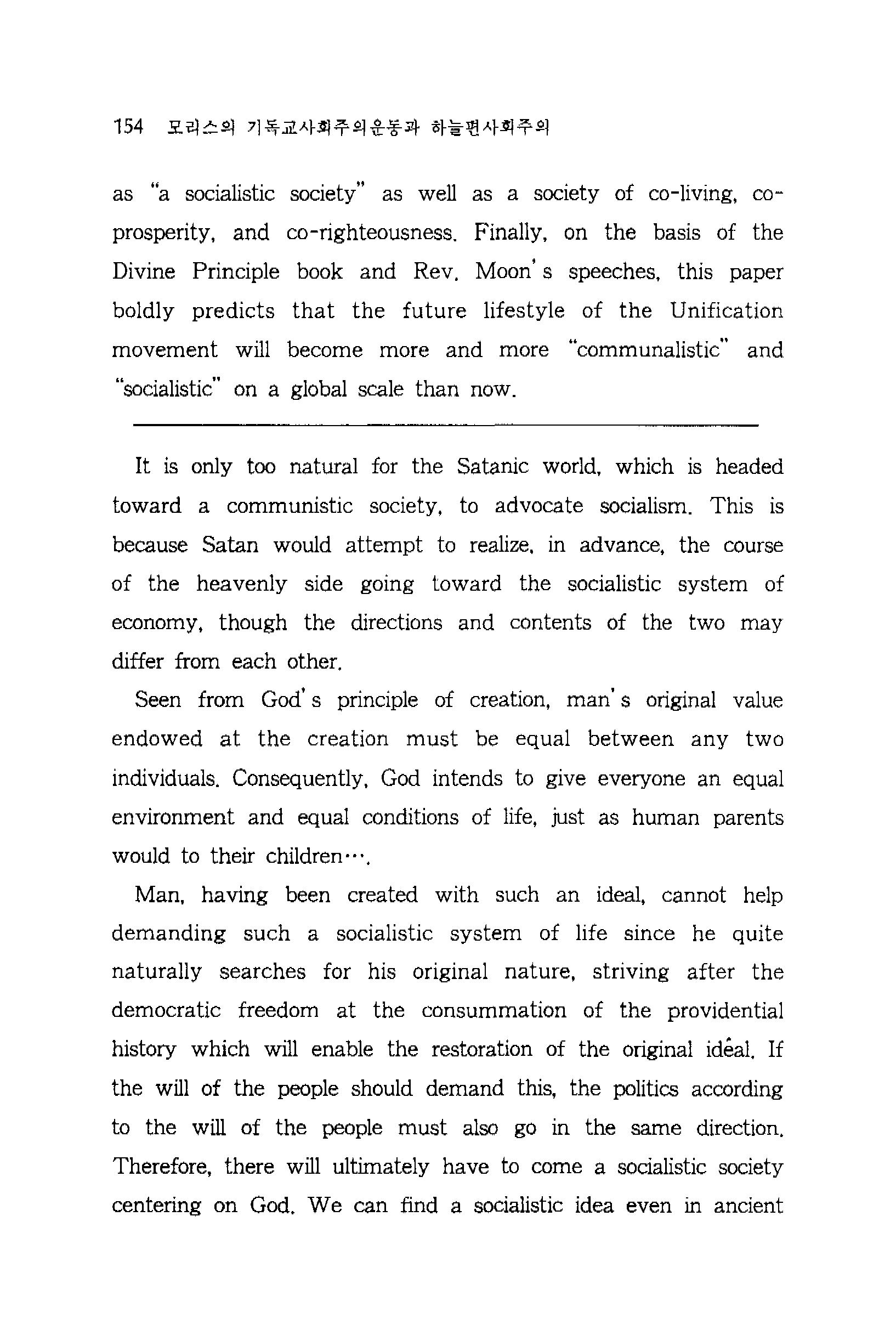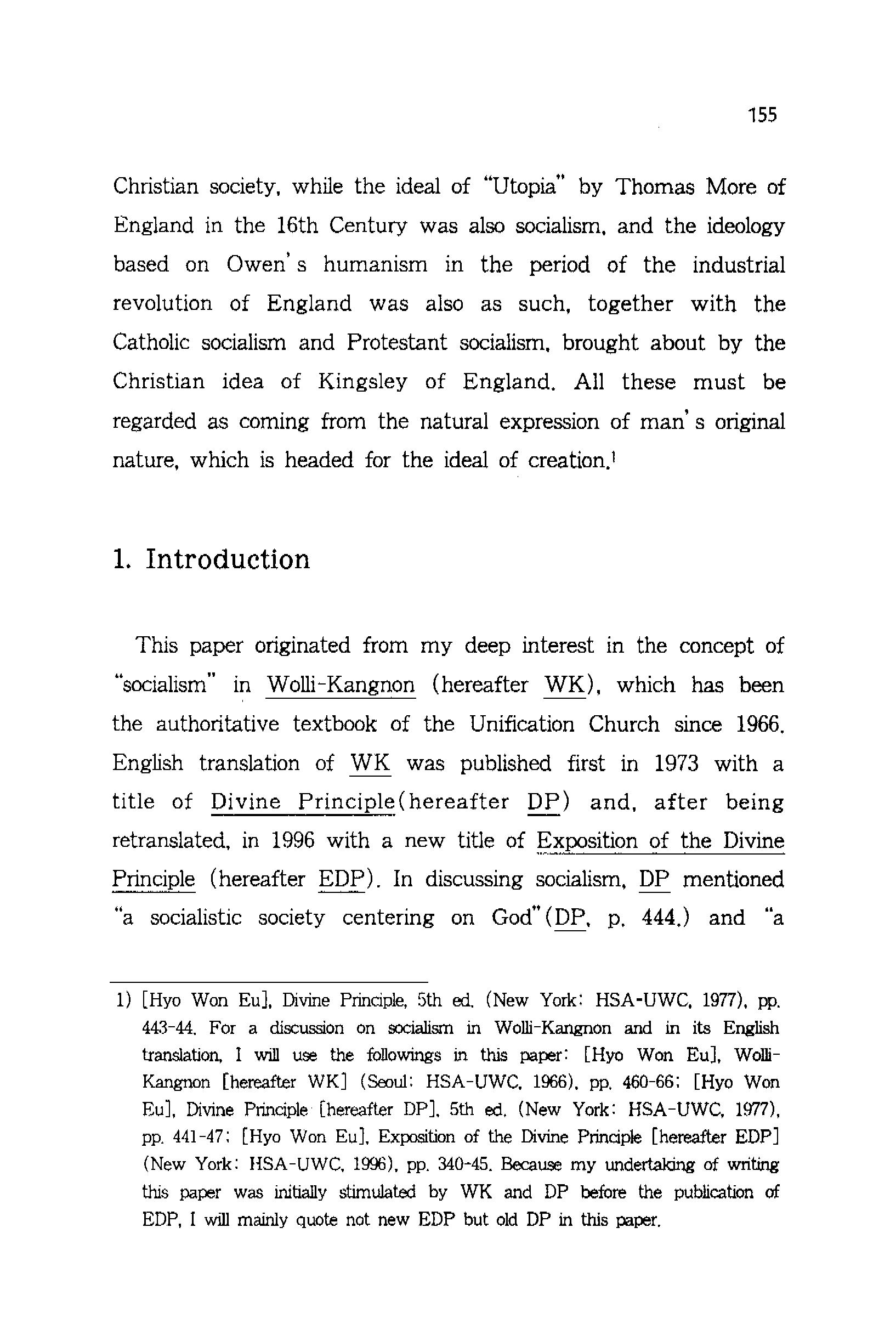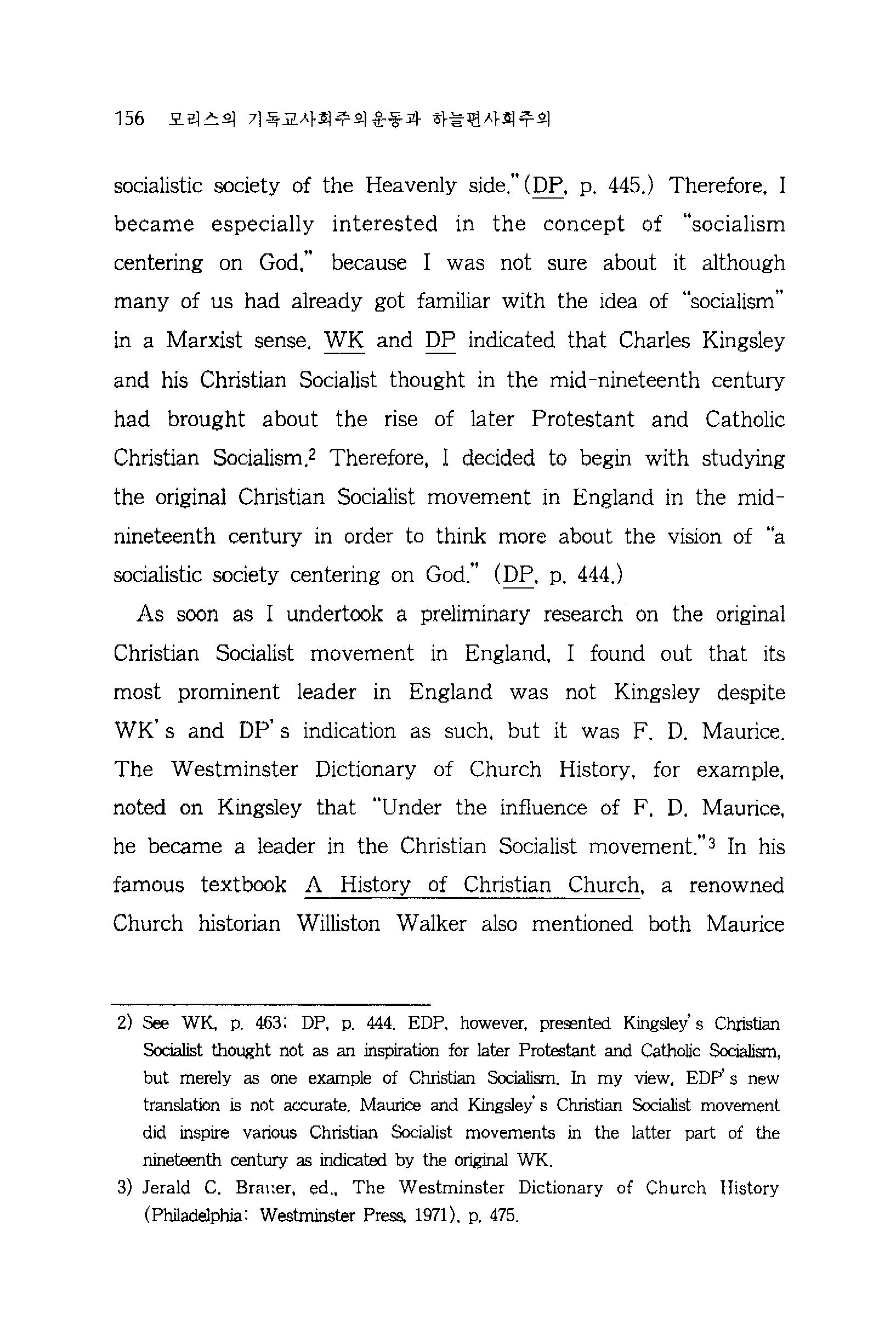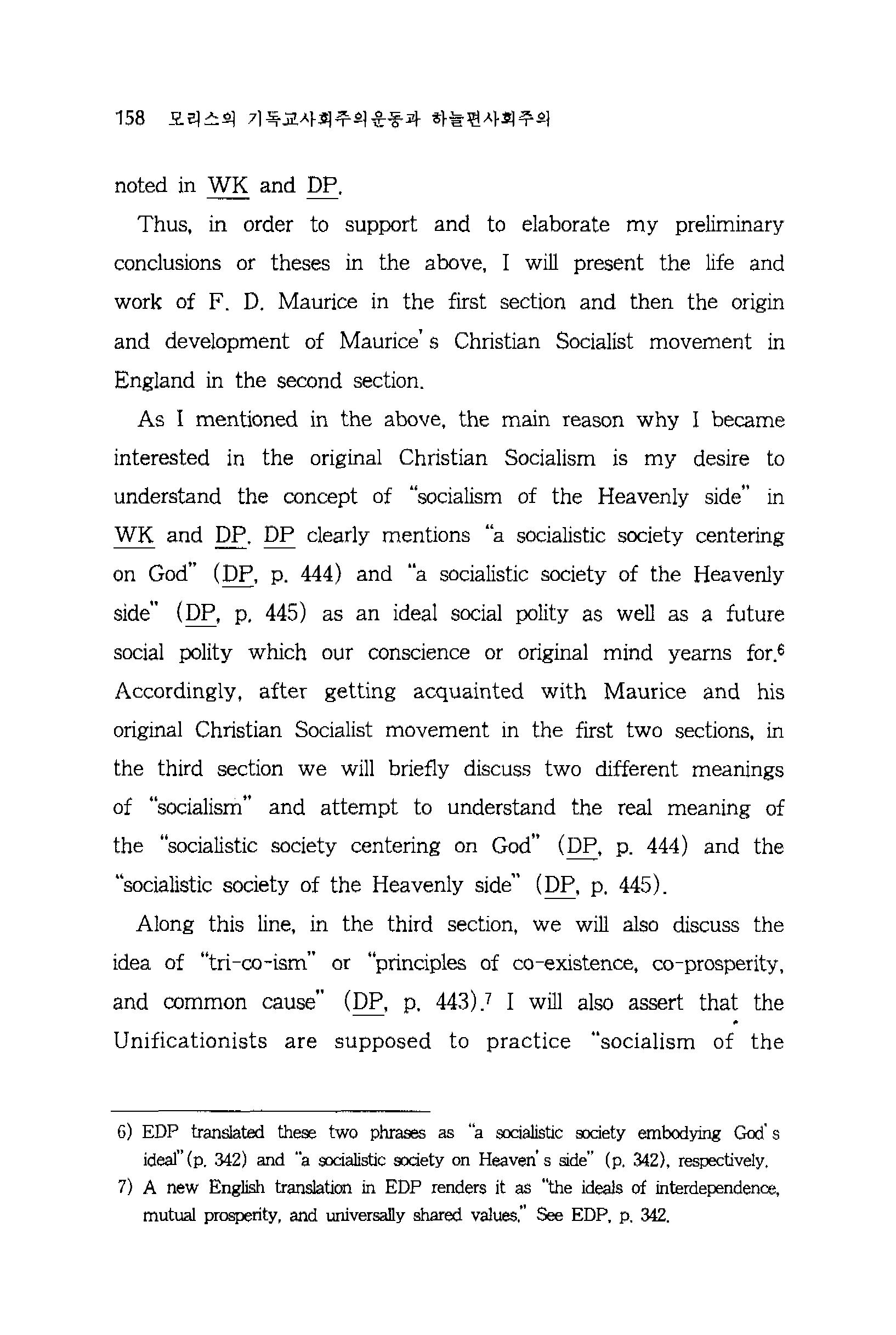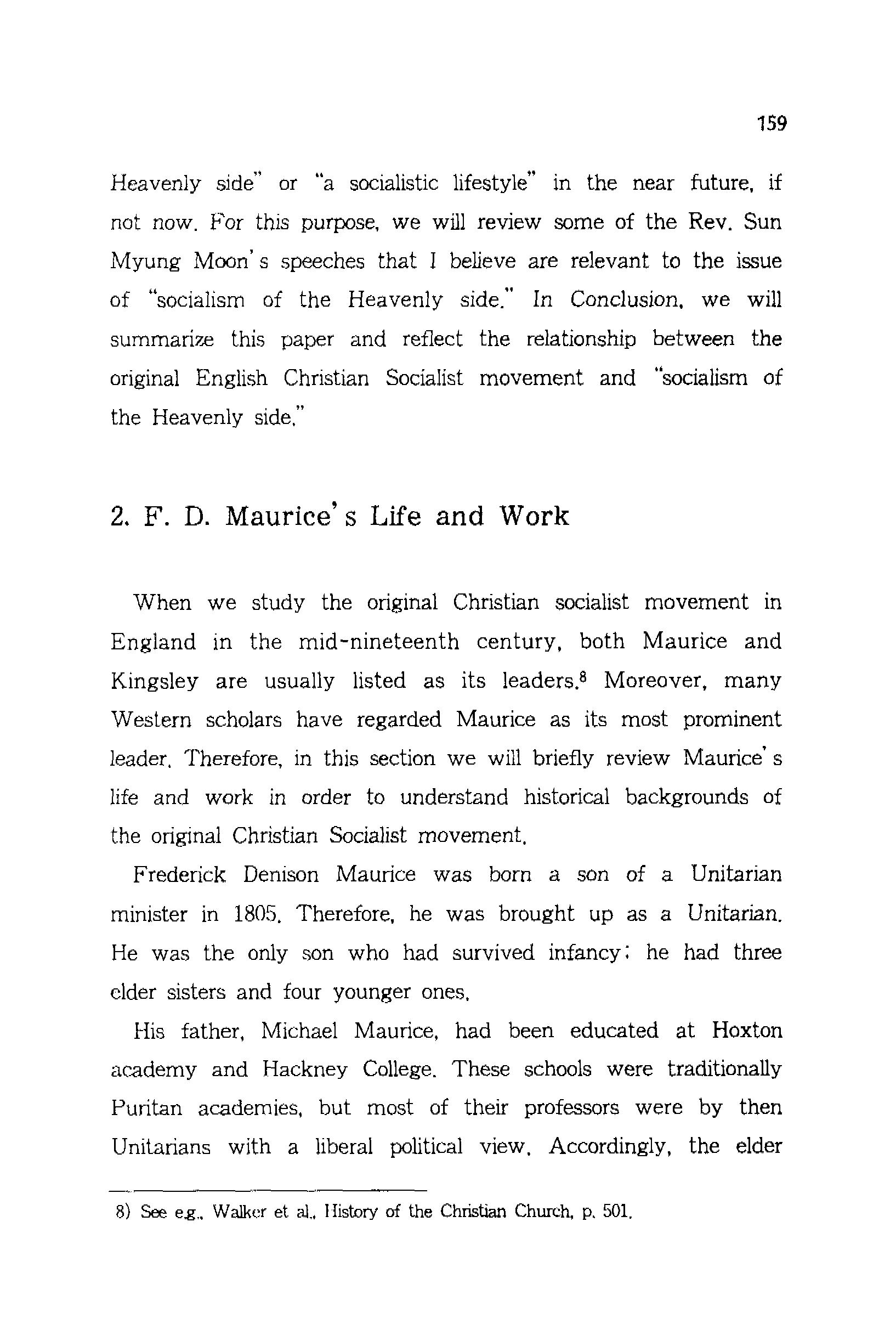2. F. D. Maurice's Life and Work
When we study the original Christian socialist movement in England m the mid-nineteenth century, both Maurice and Kingsley are usually listed as its leaders.a Moreover, many Western scholars have regarded Maurice as its most prominent leader. Therefore, in this section we will briefly review Maurice' s life and work in order to understand historical backgrounds of the original Christian Socialist movement.
Frederick Denison Maurice was born a son of a Unitarian minister in 1805. Therefore, he was brought up as a Unitarian. He was the only son who had survived infancy: he had three cider sisters and four younger ones.
His father, Michael Maurice, had been educated at Haxton ac-.ademy and Hackney College. These schools were traditionally Puritan academies, but most of their professors were by then Unitarians with a liberal political view. Accordingly, the elder
8) See e_g., Walker et al., I Iistory of the Christian Church, p, 501.
159
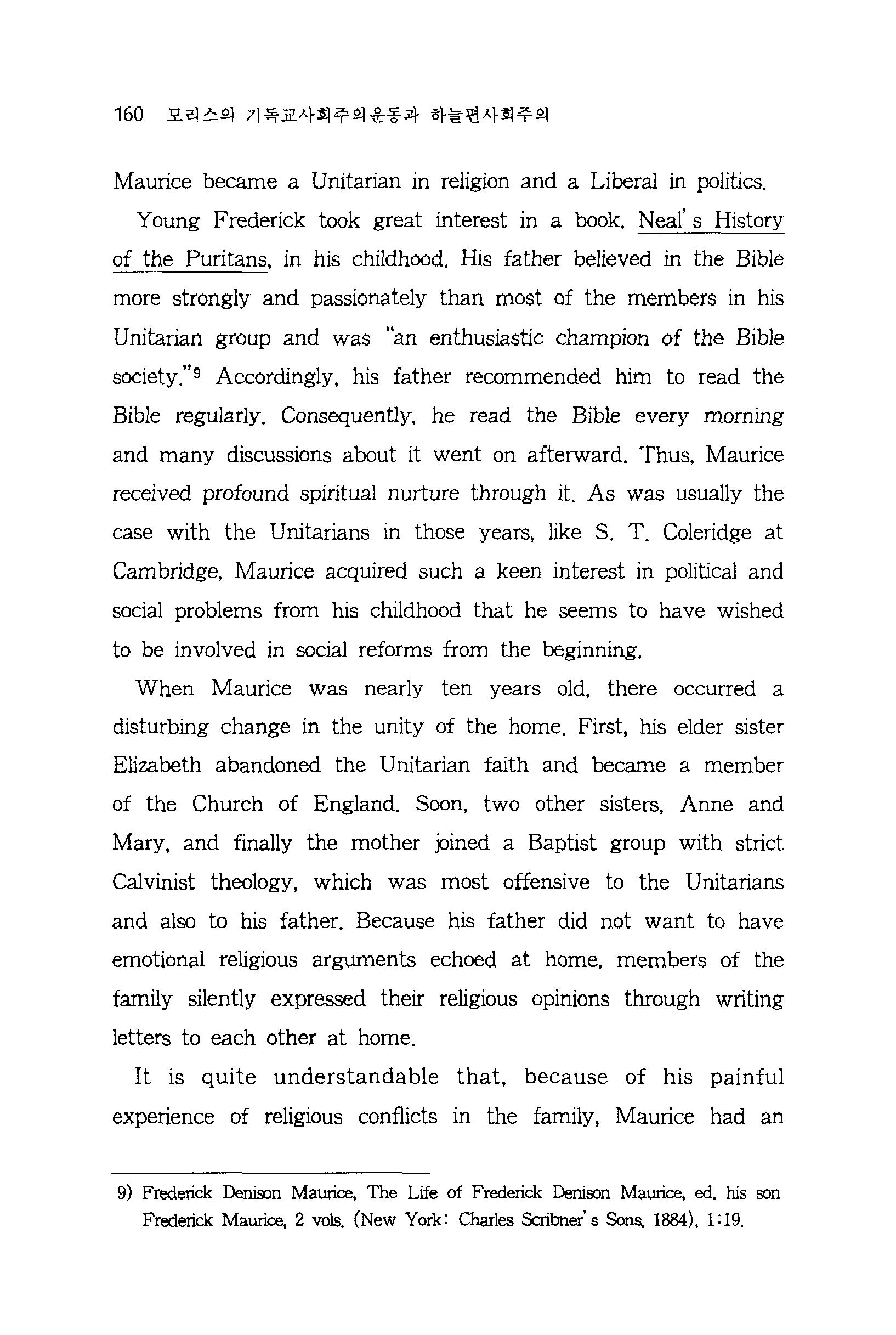
Maurice became a Unitarian in religion and a Liberal in politics.
Young Frederick took great interest in a book, Neal' s History of the Puritans, in his childhood. His father believed in the Bible more strongly and passionately than most of the members in his Unitarian group and was "an enthusiastic champion of the Bible society." 9 Accordingly, his father recommended him to read the Bible regularly, Consequently, he read the Bible every morning and many discussions about it went on afterward. Thus, Maurice received profound spiritual nurture through it. As was usually the case with the Unitarians in those years, like S. T. Coleridge at Cambridge, Maurice acquired such a keen interest in political and social problems from his childhood that he seems to have wished to be involved in social reforms from the beginning,
When Maurice was nearly ten years old, there occurred a disturbing change in the unity of the home. First, his elder sister Elizabeth abandoned the Unitarian faith and became a member of the Church of England. Soon, two other sisters, Anne and Mary, and finally the mother pined a Baptist group with strict Calvinist theology, which was most offensive to the Unitarians and also to his father. Because his father did not want to have emotional religious arguments echoed at home, members of the family silently expressed their religious opinions through writing letters to each other at home.
It is quite understandable that, because of his painful experience of religious conflicts in the family, Maurice had an
9) Frederick Denioon Maurice, The Life of Frederick Denioon Maurice, ed. his son Frederick Maurice, 2 vols. (New York: Charles Scribner's Sons, 1884), 1:19_
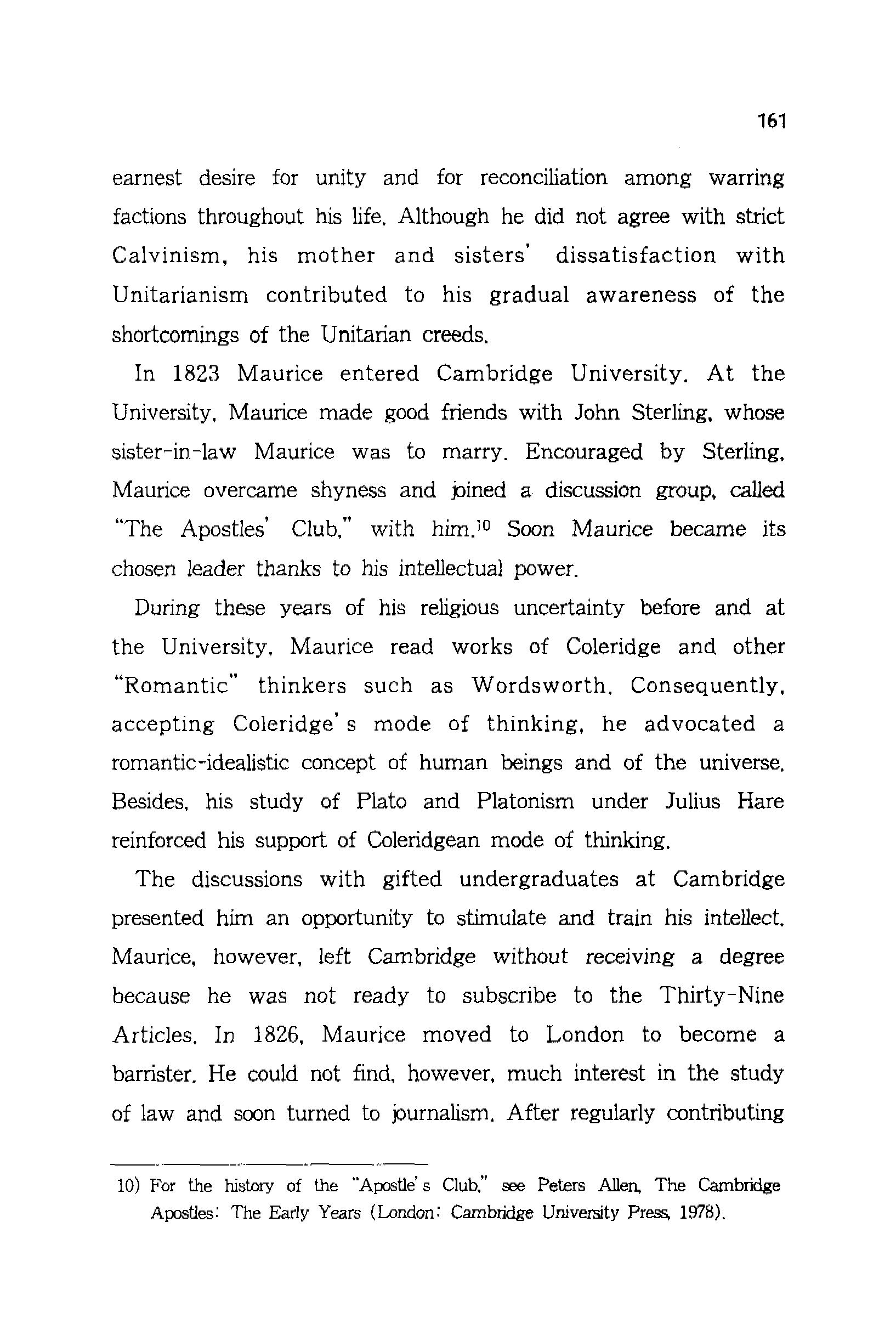
earnest desire for unity and for reconciliation among warring factions throughout his life. Although he did not agree with strict Calvinism, his mother and sisters' dissatisfaction with Unitarianism contributed to his gradual awareness of the shortcomings of the Unitarian creeds.
In 1823 Maurice entered Cambridge University. At the University, Maurice made good friends with John Sterling, whose sister-in-law Maurice was to marry_ Encouraged by Sterling, Maurice overcame shyness and pined a discussion group, called "The Apostles' Club," with him. 10 Soon Maurice became its chosen leader thanks to his intellectual power.
During these years of his religious uncertainty before and at the University, Maurice read works of Coleridge and other "Romantic" thinkers such as Wordsworth. Consequently, accepting Coleridge' s mode of thinking, he advocated a romantic-idealistic concept of human beings and of the universe. Besides, his study of Plato and Platonism under Julius Hare reinforced his support of Coleridgean mode of thinking,
The discussions with gifted undergraduates at Cambridge presented him an opportunity to stimulate and train his intellect. Maurice, however, left Cambridge without receiving a degree because he was not ready to subscribe to the Thirty-Nine Articles. In 1826, Maurice moved to London to become a barrister. He could not find, however, much interest in the study of law and soon turned to purnalism. After regularly contributing
10) For the history of the "Apostle's Club." ree Peters Allen, The Cambridge Apostles: The Early Years (London: Cambridge University Press, 1978).
161
___ __________
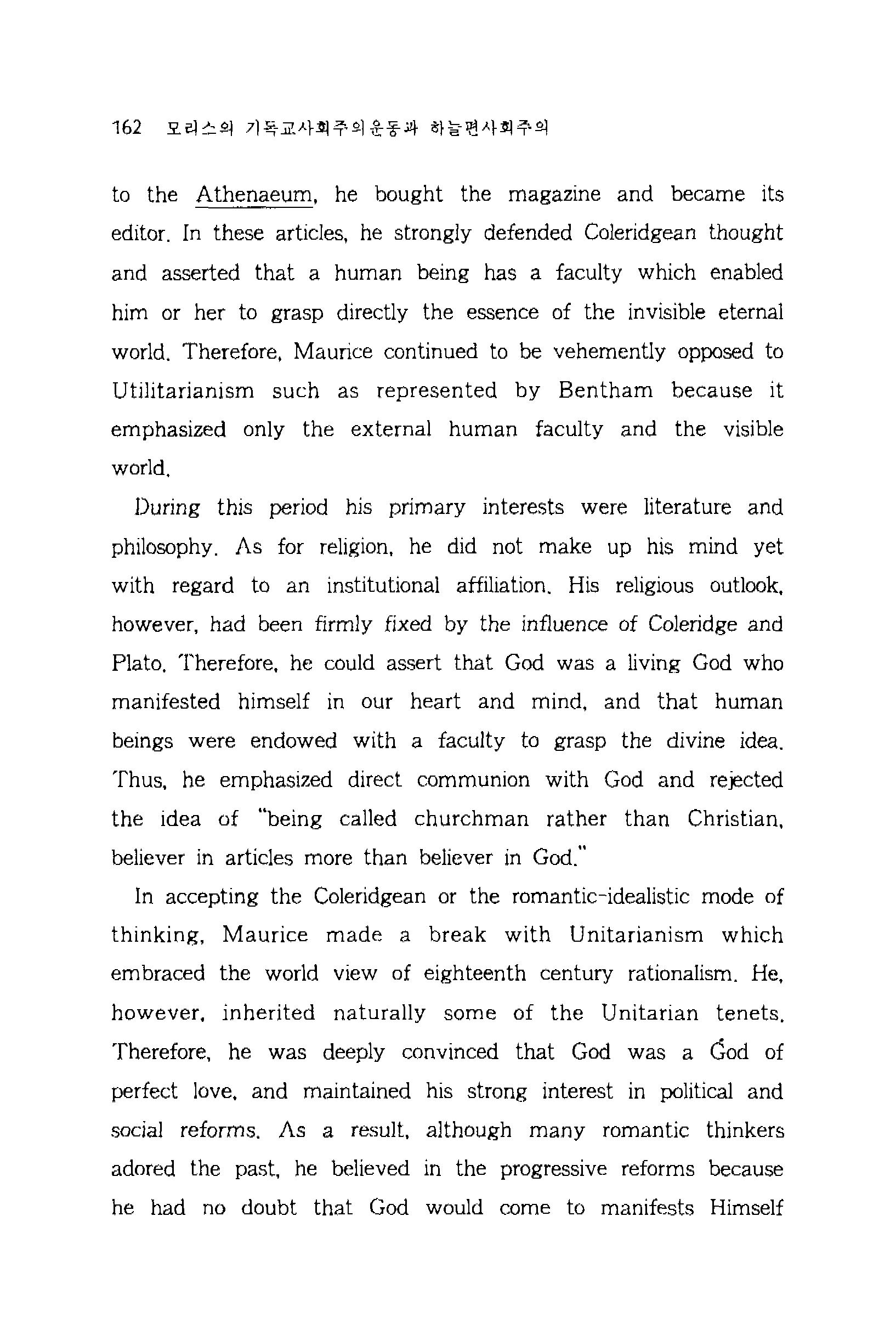
to the Athenaeum, he bought the magazine and became its editor. In these articles, he strongly defended Coleridgean thought and asserted that a human being has a faculty which enabled him or her to grasp directly the essence of the invisible eternal world. Therefore, Maurice continued to be vehemently opposed to Utilitarianism such as represented by Bentham because it emphasized only the external human faculty and the visible world.
During this period his primary interests were literature and philosophy_ As for religion, he did not make up his mind yet with regard to an institutional affiliation. His religious outlook, however, had been firmly fixed by the influence of Coleridge and Plato. Therefore, he could assert that God was a living God who manifested himself in our heart and mind, and that human beings were endowed with a faculty to grasp the divine idea. Thus, he emphasized direct communion with God and rejected the idea of "being called churchman rather than Christian, believer in articles more than believer in God."
In accepting the Coleridgean or the romantic-idealistic mode of thinking, Maurice made a break with Unitarianism which embraced the world view of eighteenth century rationalism. He, however, inherited naturally some of the Unitarian tenets. Therefore, he was deeply convinced that God was a God of perfect love, and maintained his strong interest in political and social reforms. As a result, although many romantic thinkers adored the past, he believed in the progressive reforms because he had no doubt that God would come to manifests Himself
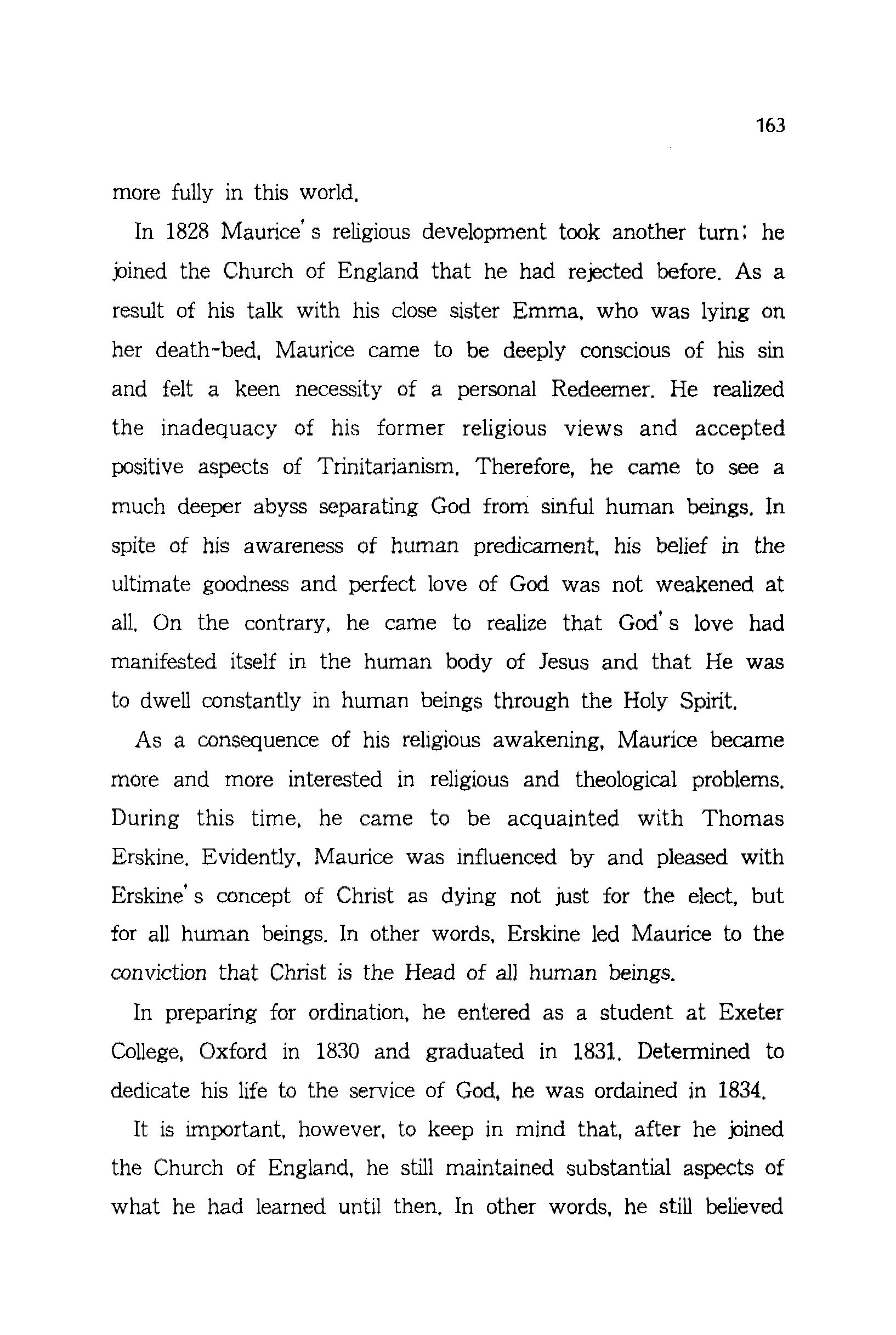
more fully in this world.
In 1828 Maurice' s religious development took another turn; he pined the Church of England that he had rejected before. As a result of his talk with his close sister Emma, who was lying on her death-bed, Maurice came to be deeply conscious of his sin and felt a keen necessity of a personal Redeemer. He realized the inadequacy of his former religious views and accepted positive aspects of Trinitarianism. Therefore, he came to see a much deeper abyss separating God from sinful human beings. In spite of his awareness of human predicament, his belief in the ultimate goodness and perfect love of God was not weakened at all. On the contrary, he came to realize that God' s love had manifested itself in the human body of Jesus and that He was to dwell constantly in human beings through the Holy Spirit.
As a consequence of his religious awakening, Maurice became more and more interested in religious and theological problems. During this time, he came to be acquainted with Thomas Erskine. Evidently, Maurice was influenced by and pleased with Erskine' s concept of Christ as dying not just for the elect, but for all human beings. In other words, Erskine led Maurice to the conviction that Christ is the Head of all human beings.
In preparing for ordination, he entered as a student at Exeter College, Oxford in 1830 and graduated in 1831. Determined to dedicate his life to the service of God, he was ordained in 1834.
It is important, however, to keep in mind that, after he pined the Church of England, he still maintained substantial aspects of what he had learned until then. In other words, he still believed
163
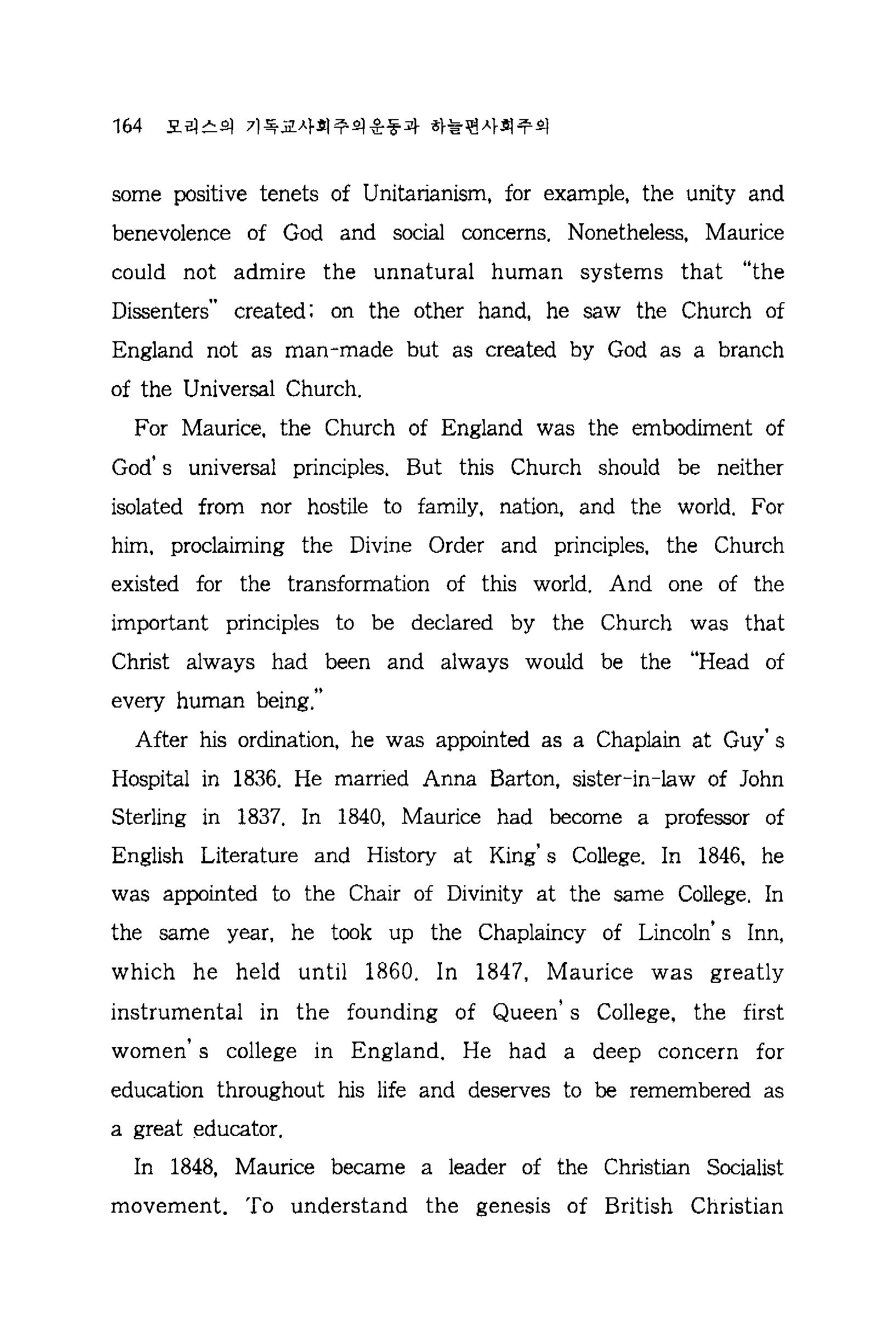
some positive tenets of Unitarianism, for example, the unity and benevolence of God and social concerns. Nonetheless, Maurice could not admire the unnatural human systems that "the Dissenters" created: on the other hand, he saw the Church of England not as man-made but as created by God as a branch of the Universal Church.
For Maurice. the Church of England was the embodiment of God' s universal principles. But this Church should be neither isolated from nor hostile to family, nation, and the world. For him, proclaiming the Divine Order and principles, the Church existed for the transformation of this world. And one of the important principles to be declared by the Church was that Christ always had been and always would be the "Head of every human being.''
After his ordination, he was appointed as a Chaplain at Guy' s Hospital in 1836. He married Anna Barton, sister-in-law of John Sterling in 1837. In 1840, Maurice had become a professor of English Literature and History at King's College. In 1846, he was appointed to the Chair of Divinity at the same College. In the same year. he took up the Chaplaincy of Lincoln' s Inn, which he held until 1860. In 1847. Maurice was greatly instrumental in the founding of Queen' s College, the first women' s college in England. He had a deep concern for education throughout his life and deserves to be remembered as a great educator.
In 1848, Maurice became a leader of the Christian Socialist movement. To understand the genesis of British Christian
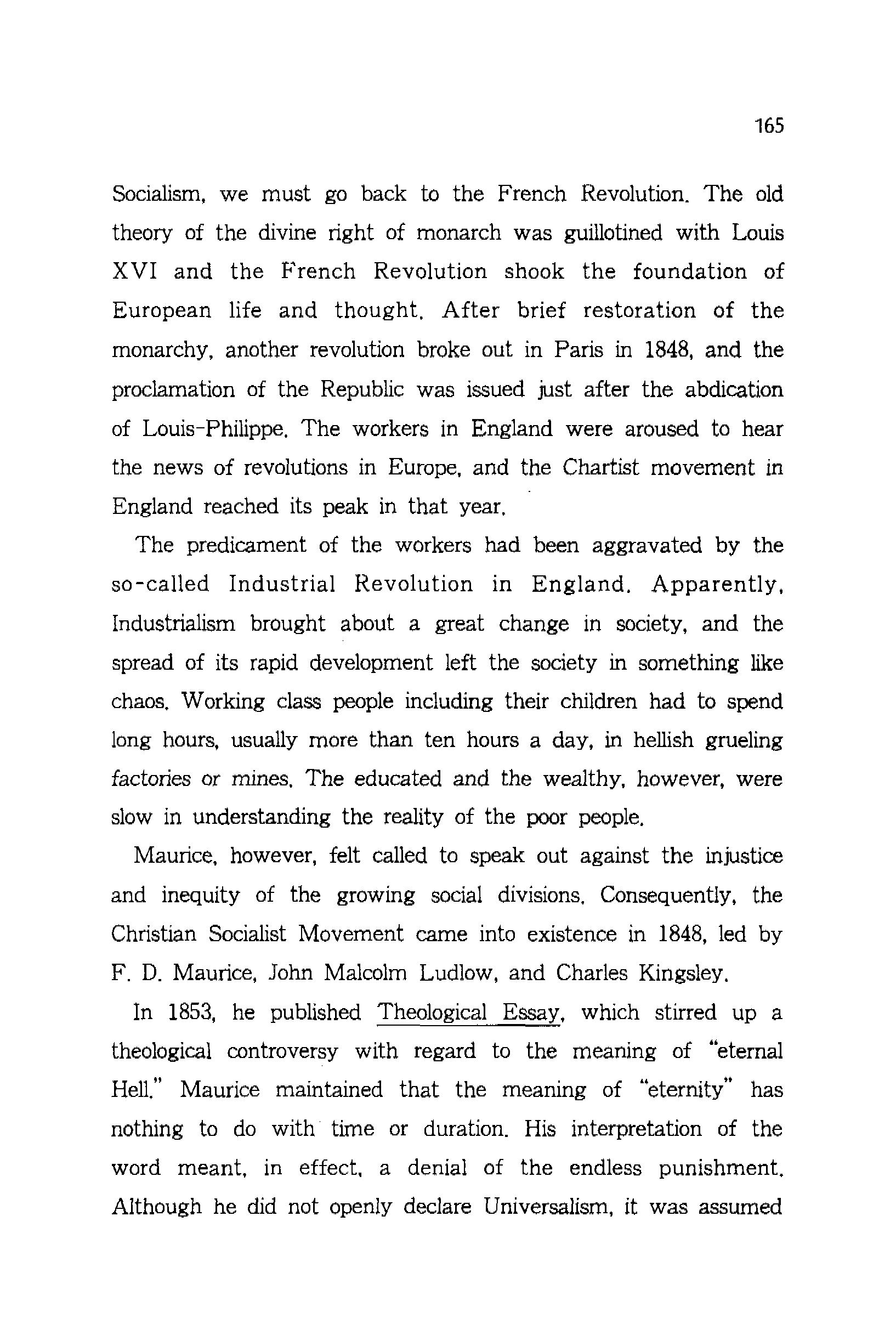
Socialism, we must go back to the French Revolution. The old theory of the divine right of monarch was guillotined with Louis XVI and the French Revolution shook the foundation of European life and thought. After brief restoration of the monarchy, another revolution broke out in Paris in 1848, and the proclamation of the Republic was issued just after the abdication of Louis-Philippe. The workers in England were aroused to hear the news of revolutions in Europe, and the Chartist movement in England reached its peak in that year.
The predicament of the workers had been aggravated by the so-called Industrial Revolution in England. Apparently, Industrialism brought about a great change in society, and the spread of its rapid development left the society in something like chaos. Working class people including their children had to spend long hours, usually more than ten hours a day, in hellish grueling factories or mines. The educated and the wealthy, however, were slow in understanding the reality of the poor people.
Maurice, however, felt called to speak out against the injustice and inequity of the growing social divisions. Consequently, the Christian Socialist Movement came into existence in 1848, led by F. D. Maurice, John Malcolm Ludlow, and Charles Kingsley,
In 1853, he published Theological Essay, which stirred up a theological controversy with regard to the meaning of "eternal Hell." Maurice maintained that the meaning of "eternity" has nothing to do with time or duration. His interpretation of the word meant, in effect, a denial of the endless punishment. Although he did not openly declare Universalism, it was assumed
165
that Maurice must be committed to the belief of universal salvation. As a result, he was dismissed from a teaching position at King's College. At the same time, his involvement in Christian Socialism developed into his efforts to establish the Working Men's College, which was finally founded in 1854 with Maurice as its Principal.
On the other hand, the Christian Socialist movement dissolved in the same year. as Maurice advised his followers to dedicate their energy to education of the poor and working class rather than to external "system-building." Maurice worked for the Working Men's College as its Principal until he was appointed to the Knightbridge Professorship of Casuistry and Moral Philosophy at Cambridge University in 1866.
As a professor at Cambridge, he published two courses of lectures, one on The Conscience and the other on Social Morality, Especially in the latter, he expressed his mature thought on the importance of human relationship in our life, namely, in the life of the family, of the nation, and of the universal human society, which he called the Church Universal. He died in 1872 as a professor at Cambridge.
3. F. D. Maurice and His Christian Socialist Movement
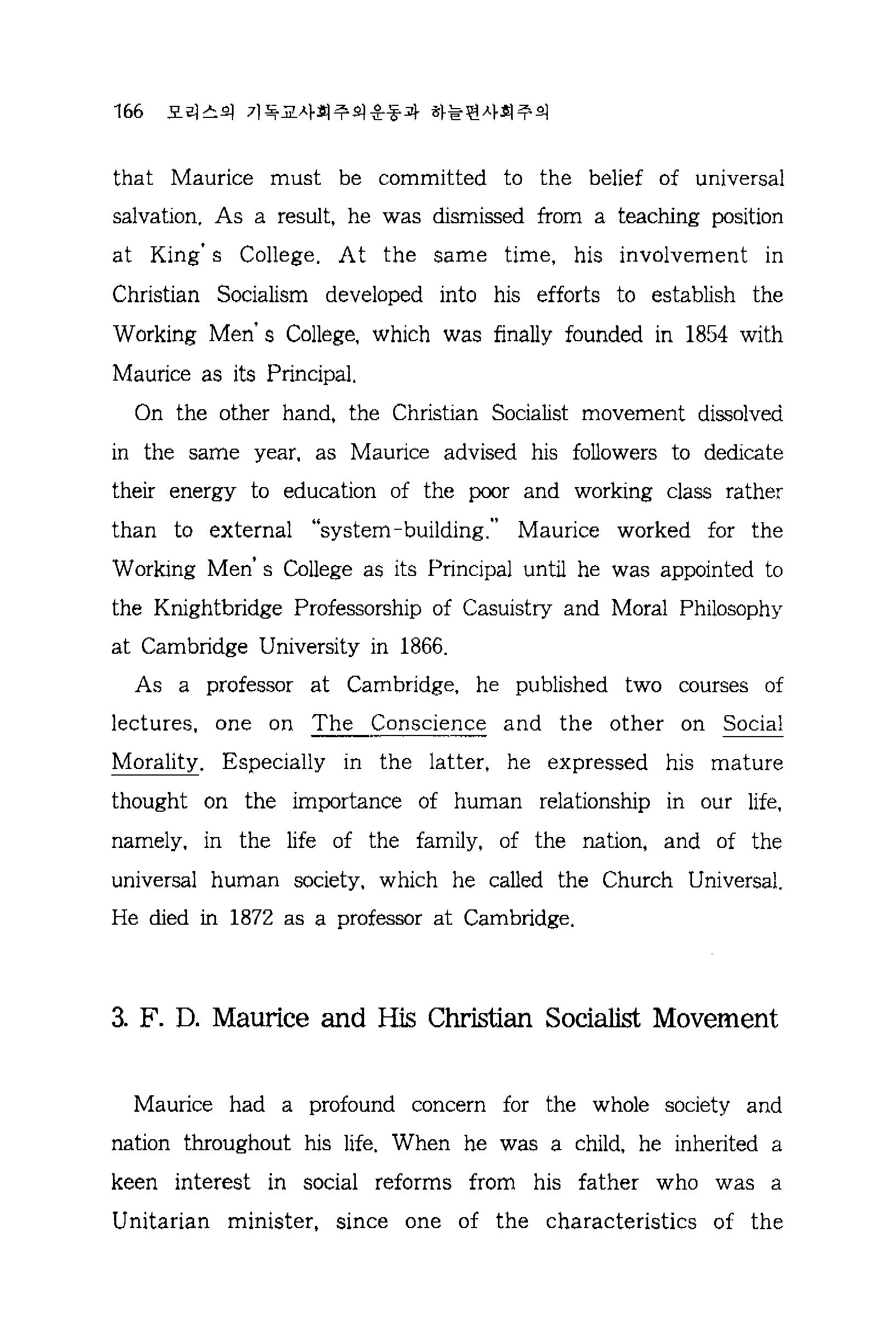
Maurice had a profound concern for the whole society and nation throughout his life. When he was a child. he inherited a keen interest in social reforms from his father who was a Unitarian minister, since one of the characteristics of the

Unitarians in those years was a strong interest m political and social reforms.
As his mentor Coleridge acquired his interest in political and social problems in his Unitarian years and maintained it after he returned to the Church of England, so Maurice never lost his concern for the whole society, Even at the time when he was viewed as a staunch defender of the Established Church after being converted to it, he maintained a deep concern for the welfare of all the people in the nation, and that especially of the poor and of the oppressed.
Ultimately, Maurice' s social concern or concern for the welfare of the whole nation found expression in his undertaking of the leadership role in the Christian Socialist movement in 1848.
Obviously, Maurice took a high view of getting involved in political and secular life. In his book The Kingdom of Christ, he answered the Quakers:
You say, there are two principles, one Christian, one secular, and that the two can never be brought into agreement; therefore, let the Christian Church have nothing to do with the ordinary, civil dealings of men. We say there are two principles, one Christian, one secular, and that the two can never be brought into agreement together: therefore, let Christianity claim dominion over all the ordinary, civil affairs of men, and deny the right of the secular principle over any of them. By the Christian principle we understand that which refers everything to God: by the secular principle we understand that which refers everything to self. I I
Maurice was a professor of theology at King's College, London, in 1848 when London panicked because of the
167
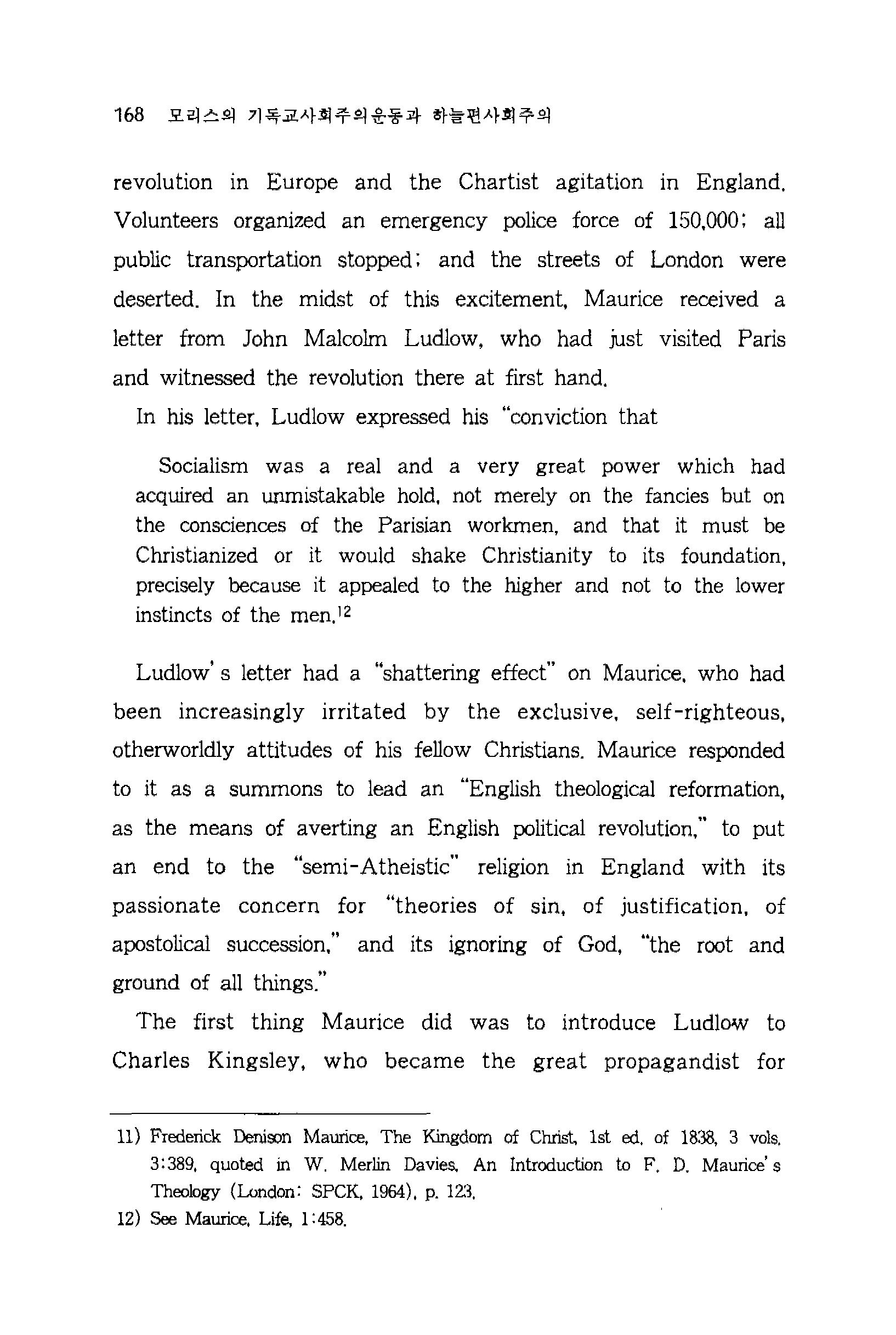
revolution in Europe and the Chartist agitation in England. Volunteers organized an emergency police force of 150,000: all public transportation stopped; and the streets of London were deserted. In the midst of this excitement, Maurice received a letter from John Malcolm Ludlow, who had just visited Paris and witnessed the revolution there at first hand.
In his letter. Ludlow expressed his "conviction that Socialism was a real and a very great power which had acquired an unmistakable hold, not merely on the fancies but on the consciences of the Parisian workmen, and that it must be Christianized or it would shake Christianity to its foundation, precisely because it appealed to the higher and not to the lower instincts of the men. 12
Ludlow's letter had a "shattering effect" on Maurice, who had been increasingly irritated by the exclusive, self-righteous, otherworldly attitudes of his fellow Christians. Maurice responded to it as a summons to lead an "English theological reformation, as the means of averting an English political revolution," to put an end to the "semi-Atheistic" religion in England with its passionate concern for "theories of sin, of justification, of apostolical succession," and its ignoring of God, "the root and ground of all things."
The first thing Maurice did was to introduce Ludlow to Charles Kingsley, who became the great propagandist for
11) Frederick Denioon Maurice, The Kingdom of Christ, 1st ed. of 1838, 3 vols. 3:389, quoted in W. Merlin Davies. An Intnxiuction to F. D. Maurice's Theology (London: SPCK, 1964), p. 123.
12) See Maurice, Life, 1 :453_
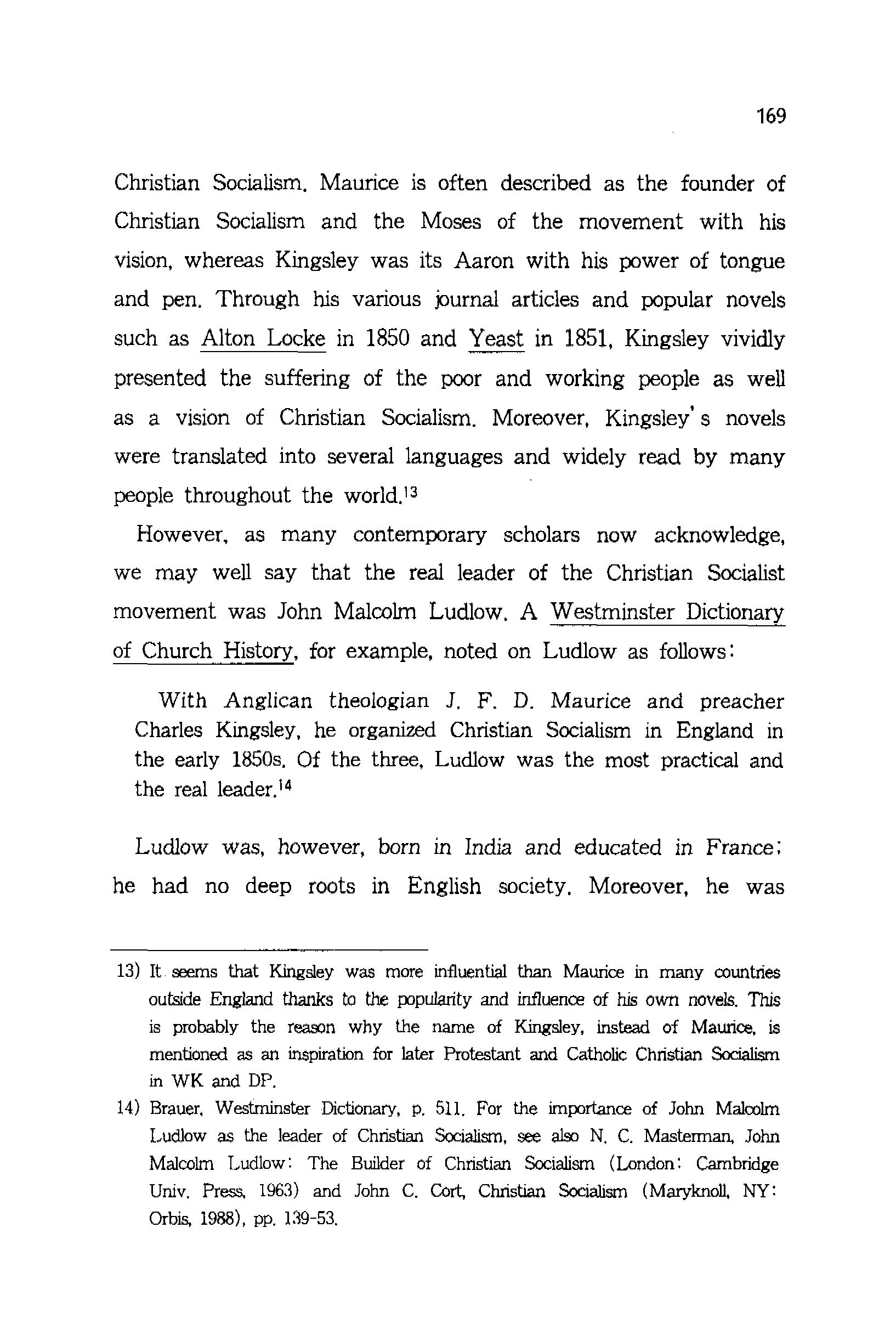
Christian Socialism. Maurice is often described as the founder of Christian Socialism and the Moses of the movement with his vision, whereas Kingsley was its Aaron with his power of tongue and pen. Through his various journal articles and popular novels such as Alton Locke in 1850 and Yeast in 1851, Kingsley vividly presented the suffering of the poor and working people as well as a vision of Christian Socialism. Moreover, Kingsley' s novels were translated into several languages and widely read by many people throughout the world. 13
However. as many contemporary scholars now acknowledge, we may well say that the real leader of the Christian Socialist movement was John Malcolm Ludlow. A Westminster Dictionary of Church History, for example, noted on Ludlow as follows:
With Anglican theologian 1. F. D. Maurice and preacher Charles Kingsley, he organized Christian Socialism in England in the early 1850s. Of the three, Ludlow was the most practical and the real leader.14
Ludlow was, however, born in India and educated in France; he had no deep roots in English society. Moreover, he was
13) It seems that Kingsley was more influential than Maurice in many countries outside England thanks to the PJpularity and influence of his own novels. This is probably the rearon why the name of Kingsley, instead of Maurice, is mentioned as an inspiration for later Protestant and Catholic Christian Socialism in WK and DP.
14) Brauer, Westminster Dictionary, P. 511. For the irnp:Jrtance of John Malcolm Ludlow as the leader of Christian Socialism, see aiS'.l N, C. Masterman, John Malcolm Ludlow: The Builder of Christian Socialism (London: Cambridge Univ. Press. 1963) and John C. Cort, Christian Socialism (Maryknoll, NY: Orbis, 1988), PP. 139-53.
169

reserved in character, though very intelligent as a young lawyer. On the other hand, Maurice was then a well-known theologian and ordained minister. Therefore, Ludlow was willing to accept Maurice' s leadership role. Besides, he was happy to find a new father figure in Maurice for the first time since he lost his father in his childhood.
The first undertaking of these Christian Socialists was to make placards addressed to the Chartists. Soon, they started publishing a penny journal, the Politics for the People. Its purpose was explained in its first number. Since it reflects Maurice's view on religion and politics, I would like to quote some of the sentences:
Politics have been separated from Christianity; religious men have supposed that their only business was with the world to come: political men have declared that the present world is governed on entirely different principles from that. So long as politics are regarded as the conflicts between Whig and Tory and Radical: so long as Christianity is regarded as a means of securing selfish rewards, they will never be united. But politics for the People cannot be separated from Religion···. The world is governed by God: this is rich man' s warning; this is the poor man' s comfort: this is the real hope in the consideration of all questions. let them be as hard of solution as they may: this is the pledge that Liberty, Fraternity, Unity, under some conditions or other, are intended for every people under heavcn.1 5
Then. in 1850 and 1851, the group published a series of Tracts on Christian Socialism. On the adoption of the name of "Christian Socialism," Maurice wrote to Ludlow:
15) Politics for the People, Vol. 1, quoted in Charles E. Raven, Christian Socialism: 1848-1854 (London: Frank Cass. 1920), p. 111.
I see it clearly. We must not beat around the bush. What right have we to address the English people? We must have something special to tell them, or we ought not to speak. "Tracts on Christian Socialism" is, it seems to me, the only title which will define our object, and will commit us at once to the conflict we must engage in sooner or later with the unsocial Christians and the unchristian Socialists. 16
In this series of tracts, Maurice presented a clear exposition of the principles underlying Christian Socialism. In the first tract, he wrote the famous definition of Socialism as follows:
The watchword of the Socialist is co-operation: the watchword of the anti-Socialist is competition. Anyone who recognizes the principle of co-operation as a stronger and truer principle than that of competition has a right to the honor or the disgrac.e of being called a Socialist. 17
In the same tract, he declared that "Christianity is the only foundation of Socialism," and that "a true Socialism is the necessary result of a sound Christianity." 18
After 1851, the Christian Socialists published a penny puma!, The Christian Socialist, which sought to promote the co-operative movement. Gradually, the supporters such as Thomas Hughes, Arthur Stanley, and E. V. Neal gathered around them. Those Christian Socialists found the Society for Promoting Working

16) Maurice. Life, z:34-35_
17) Frederick D. Maurice, "Dialogue.'" Tracts on Christian Socialism, No. 1, P. 1, quoted in Raven, Christian Socialism, P. 156.
18) Maurice, "Dialogue,'" p. 1, cited by Torben Christensen, Origin and History of Christian Socialism: 1848-54 (Copenhagen: Universitetsforlaget I Aarhus, 1962), P. !36.
171
Men' s Associations and started pilot projects in co-operative industry. They established co-operative workshops in London and the provinces for producing goods such as clothes, boots, printed books, and bread. They also founded other co-operative associations for distribution.
Although Maurice consistently had a deep concern for the whole society and nation, it seems that from the beginning there were some differences between Maurice and Ludlow in the understanding of Christian Socialism and in the methods of attaining the peace and harmony of the society. I would like to compare the view of Maurice with that of Ludlow so that we can see clearly Maurice's idea of Christian Socialism. 19
In May 1851, Maurice published a Series on English History No,_ l__by a __ Clergyman, which was planned to be the first in a series of new Tracts by Christian Socialists. In this tract, Maurice had shown the political implication of his conception of Christian Socialism. For Maurice, its aim was not to create a new order of society with the abolition of class distinctions, but it was to proclaim the Divine Order as an existing reality, to bridge the gap between the classes by educating the workers, and to bring about harmonious co-operation among all classes. Thus, Maurice' s political view was,
The Tories bore witness to the fact that the king was the center of the life of the nation; the Whigs stressed that there was "a Constitution, an order in the National Society," while it
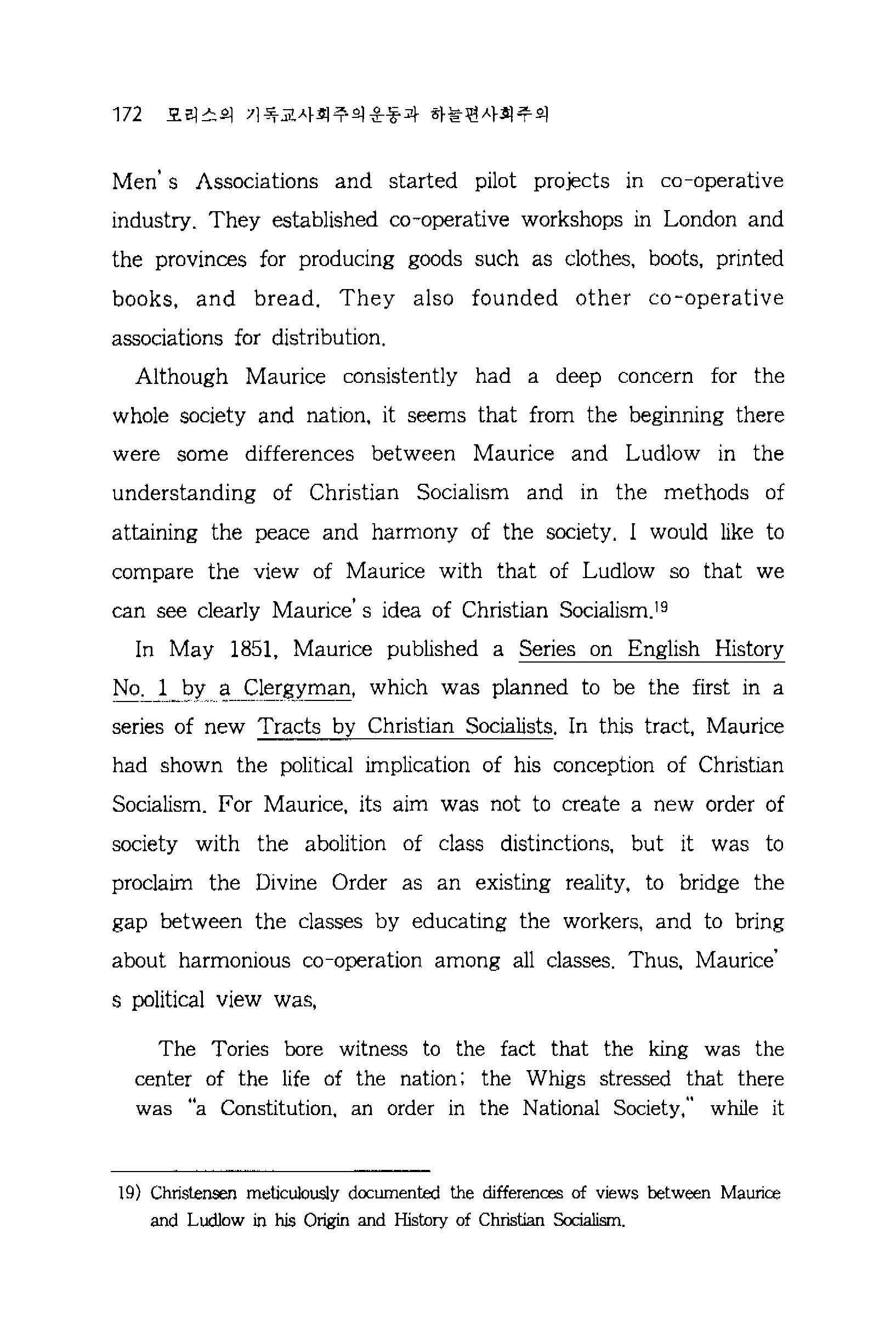
19) Christensen rnt!ticulously docwnented the differences of views between Maurice and Ludlow in his Origin and History of Christian Socialism.

was the calling of the Radicals to wage a relentless war against the evils of society, A Socialist who was bound to be faithful to the lessons of history had consequently to pledge himself to the verities represented by these political movements. He had, therefore, to be "a Tory, a Whig, and a Radicai." 20
In other words, all groups of society belonged to the body politic and each had its task to do for the benefit of the whole. These groups, however, were only able to work together in harmony if they realized that the world was God' s world where he ruled and governed. Thus, the important thing was to learn the Divine Order as an existing reality in this world.
Apparently, Ludlow did not clearly understand Maurice' s theological viewpoint at the beginning of the movement. The difference between the two, however, gradually came to the surface. In 1852, Lord Goderich wrote an essay on Democracy, The Duty of the Age. In this essay, he denounced Aristocracy while promoting Democracy_ Although Ludlow was pleased with Goderich' s essay, Maurice disagreed with his idea and suppressed its publication. This attitude of Maurice upset Ludlow, who could not believe it because Maurice's denunciation of the essay meant to denounce Democracy as the political counterpart of Christian Socialism.
In a letter to Ludlow, Maurice was forced to explain his view. He agreed with Ludlow that Socialism as the acknowledgment of a universal brotherhood was "the necessary fulfillment of the principle of the Gospel." Nevertheless, for Maurice, it was wrong
20) Ibid., P. 296.
173
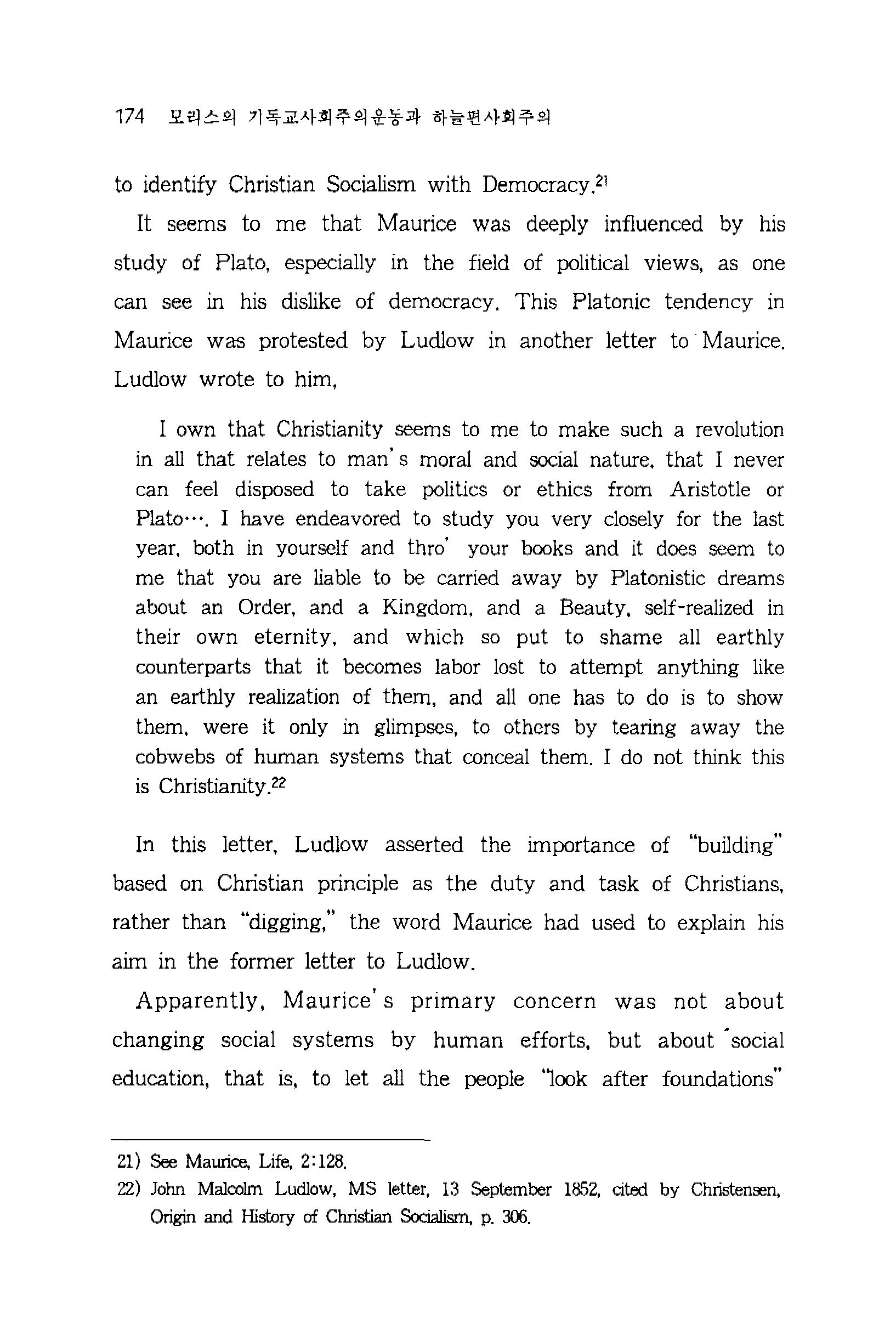
to identify Christian Socialism with Democracy,2 1
It seems to me that Maurice was deeply influenced by his study of Plato, especially in the field of political views, as one can see in his dislike of democracy, This Platonic tendency in Maurice was protested by Ludlow in another letter to Maurice. Ludlow wrote to him,
I own that Christianity seems to me to make such a revolution in all that relates to man' s moral and social nature. that I never can feel disposed to take politics or ethics from Aristotle or Plato .. ·. I have endeavored to study you very closely for the last year, both in yourself and thro' your books and it does seem to me that you are liable to be carried away by Platonistic dreams about an Order, and a Kingdom, and a Beauty, self-realized in their own eternity, and which so put to shame all earthly counterparts that it becomes labor lost to attempt anything like an earthly realization of them, and all one has to do is to show them, were it only in glimpses, to others by tearing away the cobwebs of human systems that conceal them. I do not think this is Christianity_22
In this letter, Ludlow asserted the importance of "building" based on Christian principle as the duty and task of Christians, rather than "digging," the word Maurice had used to explain his aim in the former letter to Ludlow.
Apparently, Maurice's primary concern was not about changing social systems by human efforts, but about ·social education, that is, to let all the people '1ook after foundations"
21) See Maurice, Life, 2: 128.
22) John Malcolm Ludlow, MS letter, 13 September 18.52, cited by Christenfen, Origin and History of Christian Socialism, p. 306.
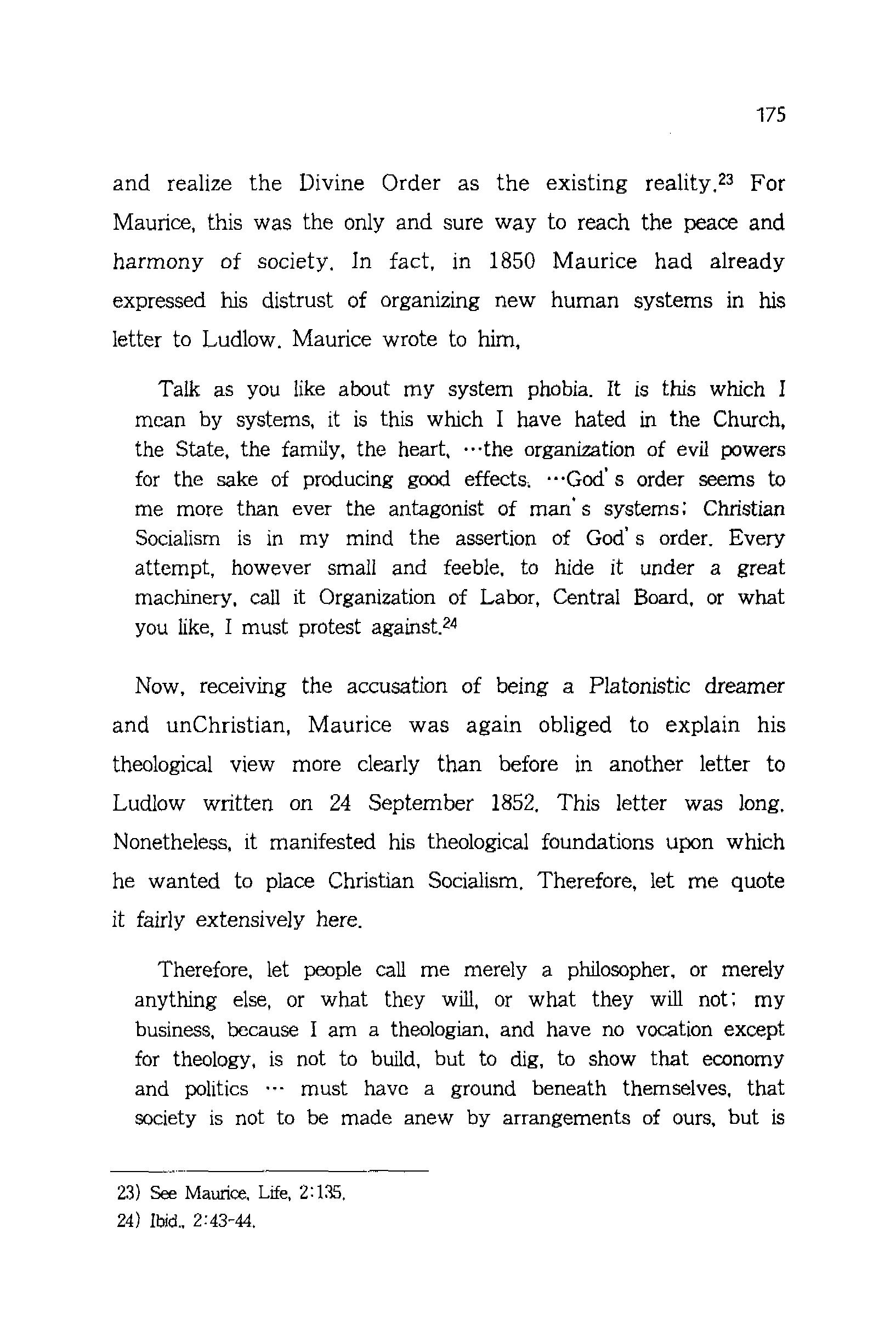
and realize the Divine Order as the existing reality, 23 For Maurice, this was the only and sure way to reach the peace and harmony of society, 1n fact, in 1850 Maurice had already expressed his distrust of organizing new human systems in his letter to Ludlow. Maurice wrote to him,
Talk as you like about my system phobia. It is this which 1 mean by systems, it is this which I have hated in the Church, the State, the family, the heart, .. ,the organization of evil powers for the sake of producing good effects, ···God' s order seems to me more than ever the antagonist of man's systems: Christian Socialism is in my mind the assertion of God' s order. Every attempt, however small and feeble, to hide it under a great machinery, call it Organization of Labor, Central Board, or what you like, I must protest against.24
Now, receiving the accusation of being a Platonistic dreamer and unChristian, Maurice was again obliged to explain his theological view more clearly than before in another letter to Ludlow written on 24 September 1852. This letter was long, Nonetheless, it manifested his theological foundations upon which he wanted to place Christian Socialism. Therefore, let me quote it fairly extensively here.
Therefore, let people call me merely a philosopher, or merely anything else, or what they will, or what they will not; my business, because I am a theologian, and have no vocation except for theology, is not to build, but to dig, to show that economy and politics · must have a ground beneath themselves, that society is not to be made anew by arrangements of ours, but is
23) See Maurice. Life, 2:B.S, 24) Ibid 2:43-44.
175

to be regenerated by finding the law and ground of its order and harmony the only secret of its existence in God. This must seem to you an unpractical and unchristian method : to me it is the only one which makes action possible, and Christianity anything more than an artificial religion for the use of believers. I wish very earnestly to be understood on this point, because all my future course must be regulated on this principle. or by no principle at all. The Kingdom of Heaven is to me the great practical existing reality which is to renew the earth and make it a habitation for blessed spirits instead of for demons.
To preach the Gospel of that Kingdom, the fact that it is among us, and is not to be set up at all, is my calling and business···. But if ever I do any good work. and earn any of the hatred, which the godly in Christ Jesus receive, and have a right to, it must be in the way I have indicated, by proclaiming society and humanity to be divine realities, as they stand, not as they may become, and by calling upon the priests, kings, and prophets of the world to answer for their sin in having made them unreal by separating them from the living and eternal God who has established them in Christ for his glory.
This is what I call digging, this is what I opJX)sc to building. 25
Thus. Maurice attached importance to regeneration of society, which was to be brought about by restoring human relations with the living God the ultimate ground of all, and not to rearrangements of society by building new systems and organizations. It seems that. even after this letter. Ludlow was unable to believe that what Maurice had written was his real opinion. He still hoped that Maurice would exercise true leadership in "building" a new society based on the principle of Christian Socialism.
25) Ibid., z:137-38,
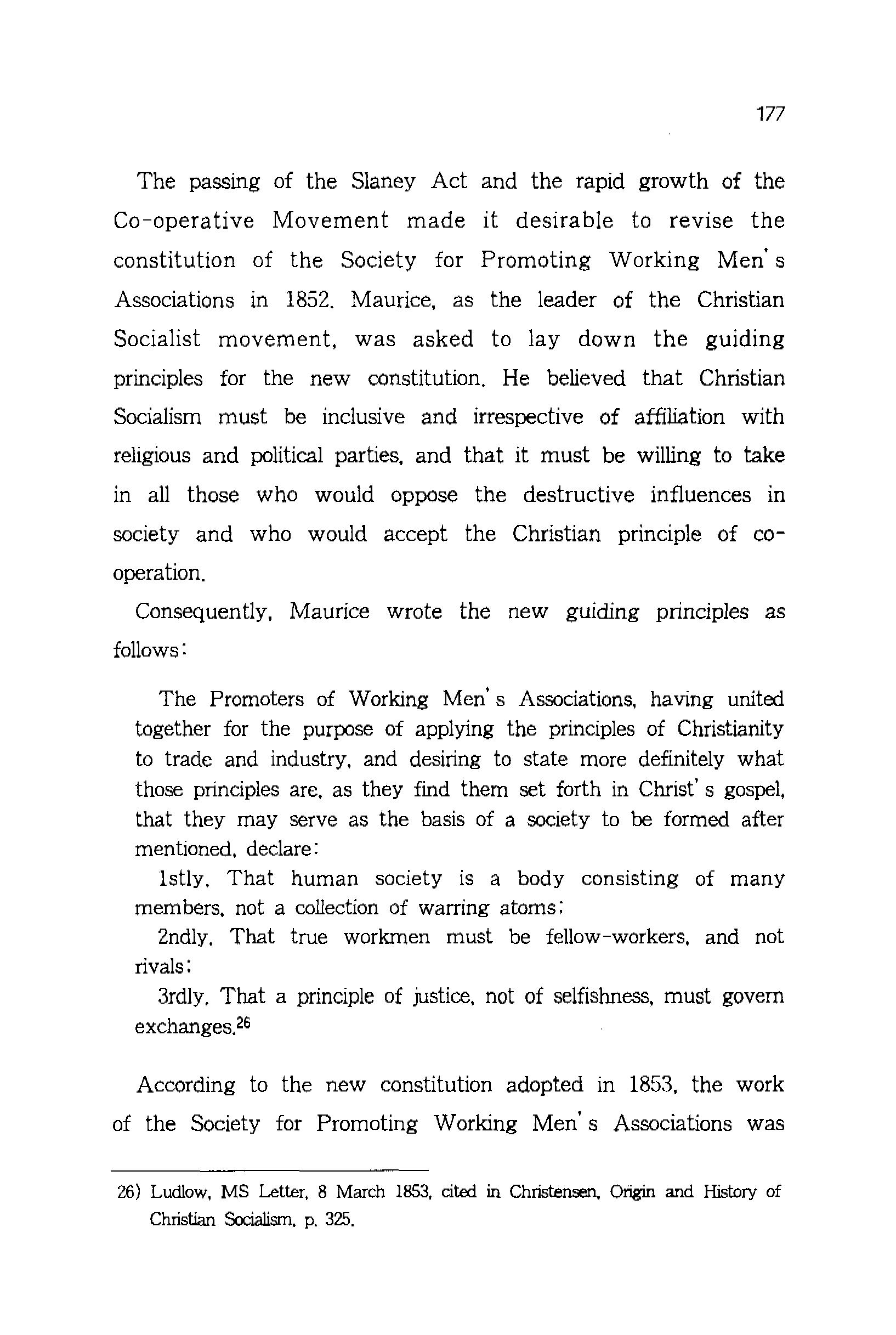
The passing of the Slaney Act and the rapid growth of the Co-operative Movement made it desirable to revise the constitution of the Society for Promoting Working Men' s Associations in 1852. Maurice, as the leader of the Christian Socialist movement, was asked to lay down the guiding principles for the new constitution. He believed that Christian Socialism must be inclusive and irrespective of affiliation with religious and political parties, and that it must be willing to take in all those who would oppose the destructive influences in society and who would accept the Christian principle of cooperation.
Consequently, Maurice wrote the new guiding principles as follows:
The Promoters of Working Men's Associations, having united together for the purpose of applying the principles of Christianity to trade and industry, and desiring to state more definitely what those principles are, as they find them set forth in Christ' s gospel, that they may serve as the basis of a society to be formed after mentioned, declare:
lstly, That human society is a body consisting of many members, not a collection of warring atoms:
Zndly, That true workmen must be fellow-workers, and not rivals:
3rdly, That a principle of justice, not of selfishness, must govern exchanges. 26
According to the new constitution adopted in 1853, the work of the Society for Promoting Working Men's Associations was
26) Ludlow, MS Letter, 8 March 1853, cited in Christensen. Origin and History of Christian Socialism. p. 325.
177
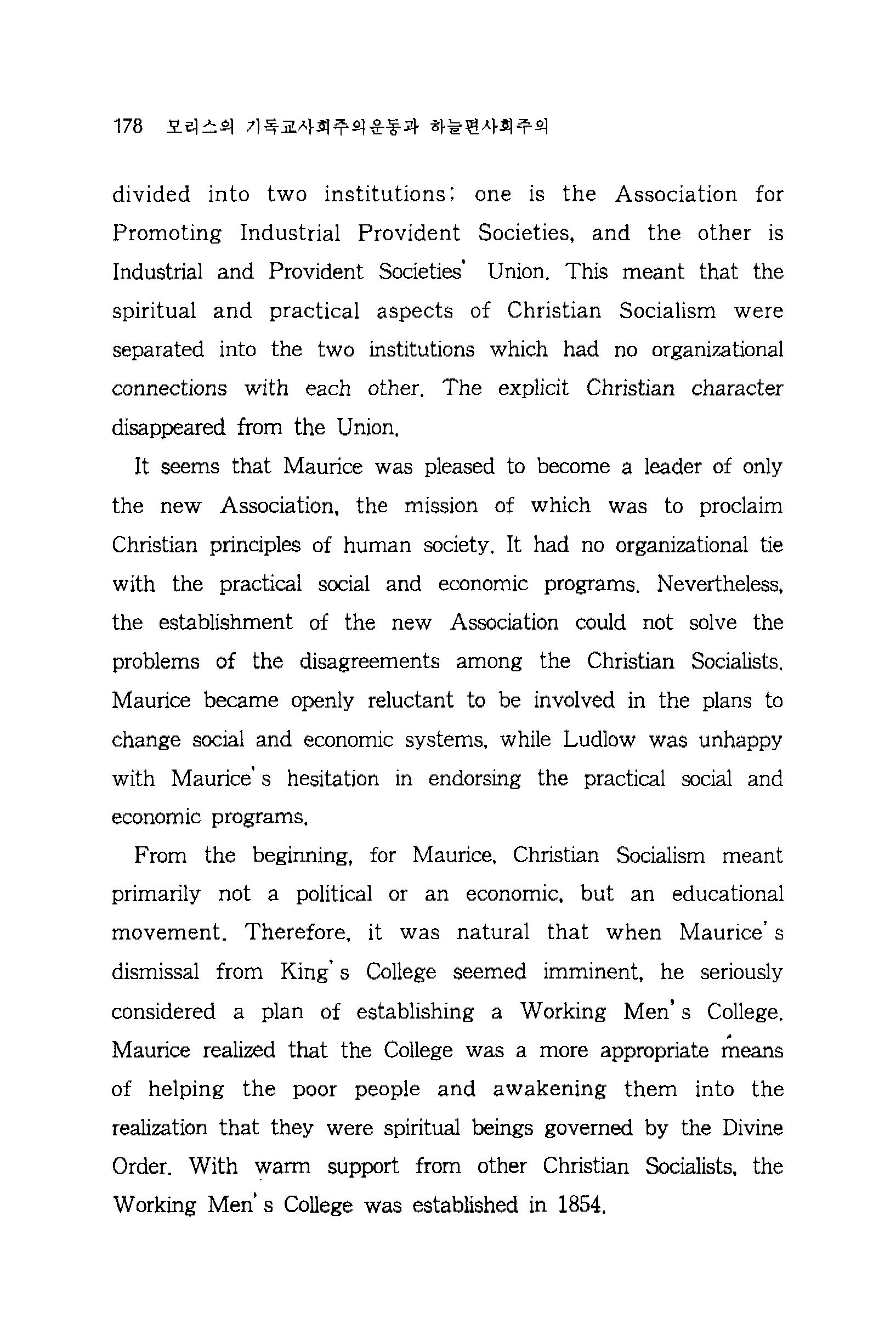
divided into two institutions; one is the Association for Promoting Industrial Provident Societies, and the other is Industrial and Provident Societies' Union. This meant that the spiritual and practical aspects of Christian Socialism were separated into the two institutions which had no organiwtional connections with each other. The explicit Christian character disappeared from the Union.
It seems that Maurice was pleased to become a leader of only the new Association. the mission of which was to proclaim Christian principles of human society, It had no organizational tie with the practical social and economic programs. Nevertheless, the establishment of the new Association could not solve the problems of the disagreements among the Christian Socialists. Maurice became openly reluctant to be involved in the plans to change social and economic systems, while Ludlow was unhappy with Maurice' s hesitation in endorsing the practical social and economic programs.
From the beginning, for Maurice, Christian Socialism meant primarily not a political or an economic, but an educational movement. Therefore, it was natural that when Maurice's dismissal from King' s College seemed imminent, he seriously considered a plan of establishing a Working Men's College, Maurice realized that the College was a more appropriate ~eans of helping the poor people and awakening them into the realization that they were spiritual beings governed by the Divine Order. With warm support from other Christian Socialists, the Working Men's College was established in 1854.

Because Maurice believed that social problems could be solved only through religious and social education, the essence of which was to teach the Divine Order as the real foundation of society, he was very much satisfied with the establishment of the Working Men's College. This establishment of the Working Men's College, however, led to the dissolution of the Christian Socialist movement. Maurice gave advice to other Christian Socialists to dissolve Christian Socialism as an organized body_ Maurice's advice was officially adopted, and most of the Christian Socialists followed him to work for the educational project of the Working Men's College, by leaving the cooperative projects mainly in Edward Vansittart Neale's hand.
Although Maurice was certainly "nervous about overdoing" practical human programs to redress social injustice and inequality, one must note that he had consistently deep social concern, which was a remarkable thing for a clergy in the midnineteenth century. His social concern was awakened and supported by his theological beliefs, which were foundations and roots of his action.
Thus, as I mentioned before, the distinct characteristics of his theology which urged him lo have a deep social concern could be summed up in his Christology : Christ as the head and king of all human beings and in his realized eschatology: the Kingdom of Christ has been already established in a universal scale as the real existence to be experienced.
In other words, Maurice believed that understanding of Christ as a common head and king would lead society to more co-
179
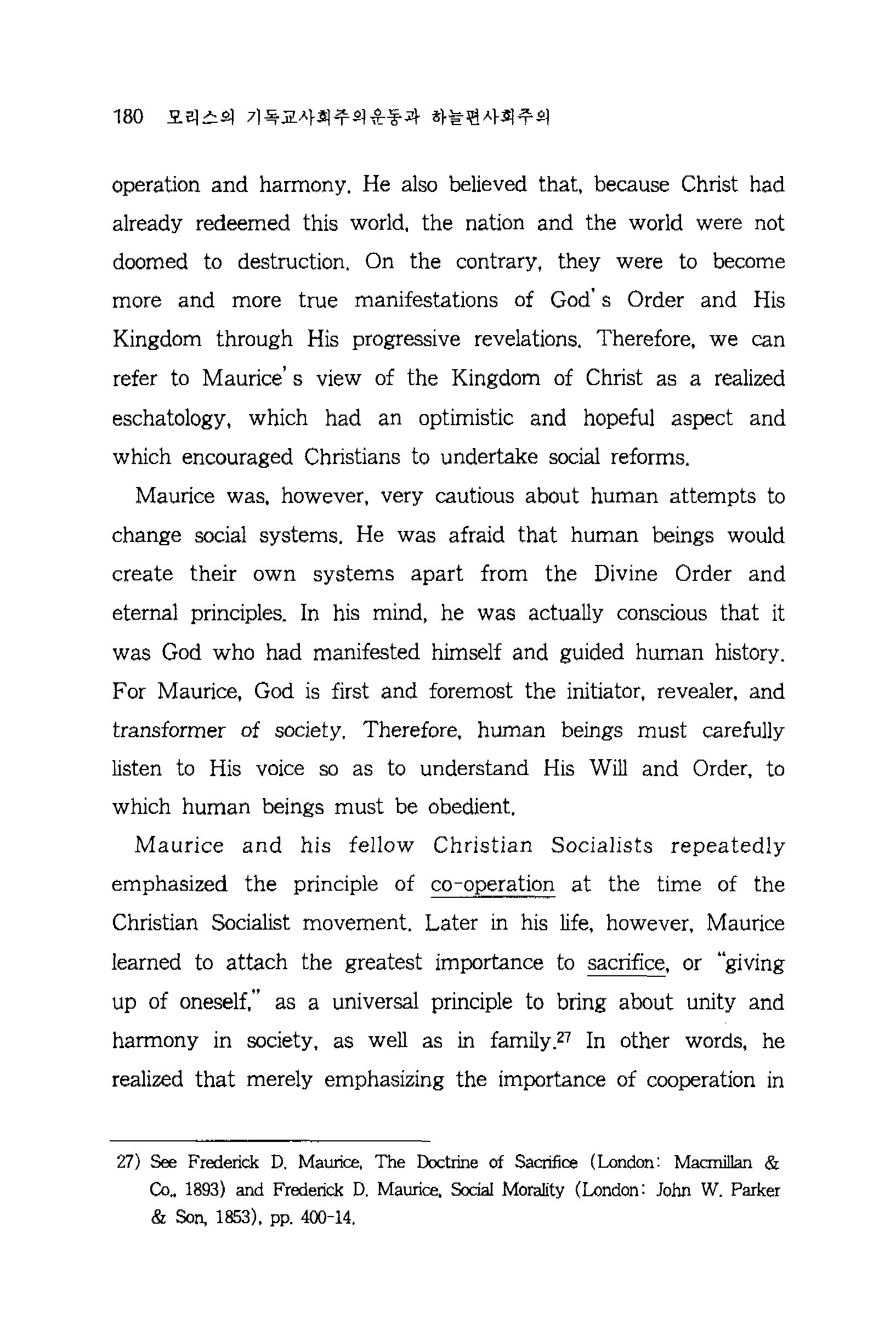
operation and harmony. He also believed that, because Christ had already redeemed this world, the nation and the world were not doomed to destruction. On the contrary, they were to become more and more true manifestations of God's Order and His Kingdom through His progressive revelations. Therefore, we can refer to Maurice' s view of the Kingdom of Christ as a realized eschatology, which had an optimistic and hopeful aspect and which encouraged Christians to undertake social reforms.
Maurice was, however, very cautious about human attempts to change social systems. He was afraid that human beings would create their own systems apart from the Divine Order and eternal principles. In his mind, he was actually conscious that it was God who had manifested himself and guided human history. For Maurice, God is first and foremost the initiator, revealer, and transformer of society, Therefore, human beings must carefully listen to His voice so as to understand His Will and Order, to which human beings must be obedient.
Maurice and his fellow Christian Socialists repeatedly emphasized the principle of co-operation at the time of the Christian Socialist movement. Later in his life, however, Maurice learned to attach the greatest importance to sacrifice, or "giving up of oneself," as a universal principle to bring about unity and harmony in society, as well as in family. 27 In other words, he realized that merely emphasizing the importance of cooperation in
27) See Frederick D. Maurice, The Doctrine of Sacrifice (London: Macmillan & Co.. 1893) and Frederick D. Maurice, Social Morality (London: John W. Parker & Son, 1853), pp. 400-14.

society would not bring about the desired result. Therefore, he emphasized mutual "sacrifice," which is a practice of true love, as a prerequisite for unity in society,
4. A Discussion on "Socialism of the Heavenly Side"
4. 1. Two Different Meanings of Socialism
The word "socialism" has had a number of different meanings. The most prevalent meaning of socialism in our contemporary time is derived from Marxism. According to the Marxist explanation, a socialist society is a society where "the means of production" is owned, not by individuals, but by collectivities or by a nation. Therefore, "socialism" in the Marxist thought 1s closely related with "socialization" that refers to "collectivization" or "nationalization" of the means of production. Nonetheless, it is clear that the "socialist society of the Heavenly side" in DP does not mean such a society as the means of production is collectivized or nationalized. Then, what kind of society is it? It may help us understand the true meaning of the "socialistic society of the Heavenly side" (DP, p. 445) to know the existence of the two different meanings of "social" and of "socialization."
The first meaning of "social" and of "socialization" is related with the so~called '1arge society." This is the Marxist meaning of "socialization," which is nothing but "collectivization" or "nationalization" of the means of production. On the other hand,
181

the second meaning of "social" and of "socialization" is related with the so-called "small society" or with "the relationship between a person and another person." Thus, the "social" in the "social dance" is concerned, not with the "large society," but with the "small society" or with "the relationship between a person and another person." In my view, the "socialistic society of the Heavenly side" (DP. p_ 445) is concerned more with the latter meaning than with the former meaning. In this sense; we might well coin a new English word and refer to "socialism of the Heavenly side" as "socializationism" with the latter meaning.
If we want to understand a certain concept to a full extent, it is essential for us to identify its opponent or target of critique as well as its similar terms or phrases. In other words, we must know antonyms and synonyms of a conceptual term to comprehend it,
What is an antonym of socialism in the Marxist sense? There is no question that it is capitalism. Capitalism is the main target of critique by Marxism and the archrival of the Marxist idea of socialism. Then what is a synonym of socialism in the Marxist sense? We may express it as collectivism. Forced collectivism will be a more accurate expression of the reality of socialism based on Marxism - Lenninism.
The questions are, however, the antonym and synonym of "socialism of the Heavenly side." First of all, what is the main target of critique by "socialism of the Heavenly side"? It is my view that, if we judge on the basis of Reverend Moon's speeches, we can discern extreme individualism or atomistic
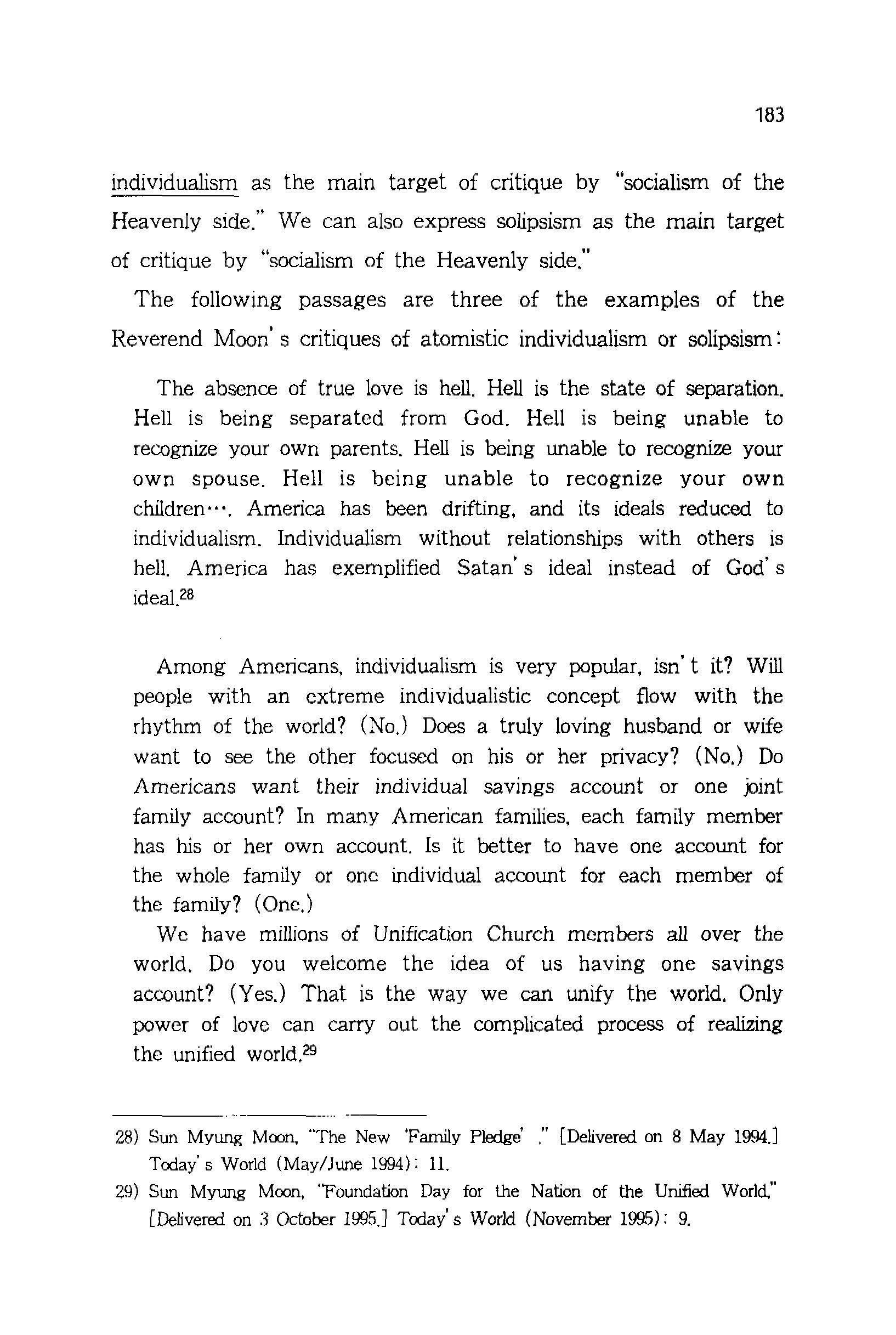
individualism as the main target of critique by "socialism of the Heavenly side." We can also express solipsism as the main target of critique by "socialism of the Heavenly side."
The following passages are three of the examples of the Reverend Moon's critiques of atomistic individualism or solipsism:
The absence of true love is hell. Hell is the state of separation. Hell is being separated from God. Hell is being unable to recognize your own parents. Hell is being unable to recognize your own spouse. Hell is being unable to recognize your own children···. America has been drifting, and its ideals reduced to individualism. Individualism without relationships with others is hell. America has exemplified Satan' s ideal instead of God' s ideal. 28
Among Americans, individualism is very popular, isn' t it? Will people with an extreme individualistic concept flow with the rhythm of the world? (No.) Does a truly loving husband or wife want to see the other focused on his or her privacy? (No.) Do Americans want their individual savings account or one joint family account? In many American families, each family member has his or her own account. Is it better to have one account for the whole family or one individual account for each member of the family? (One.)
We have millions of Unification Church members all over the world. Do you welcome the idea of us having one savings account? (Yes.) That is the way we can unify the world. Only power of love can carry out the complicated process of realizing the unified world. 29
28) Sun Myung Moon. 'The New 'Family Pledge' .'' [Delivered on 8 May 1994.l Tooay' s World (May/June 1994): 11.
29) Sun Myung Moon, "Foundation Day for the Nation of the Unified World," [Delivered on :1 October 199fi.] Tooay' s World (November 1995): 9.
183
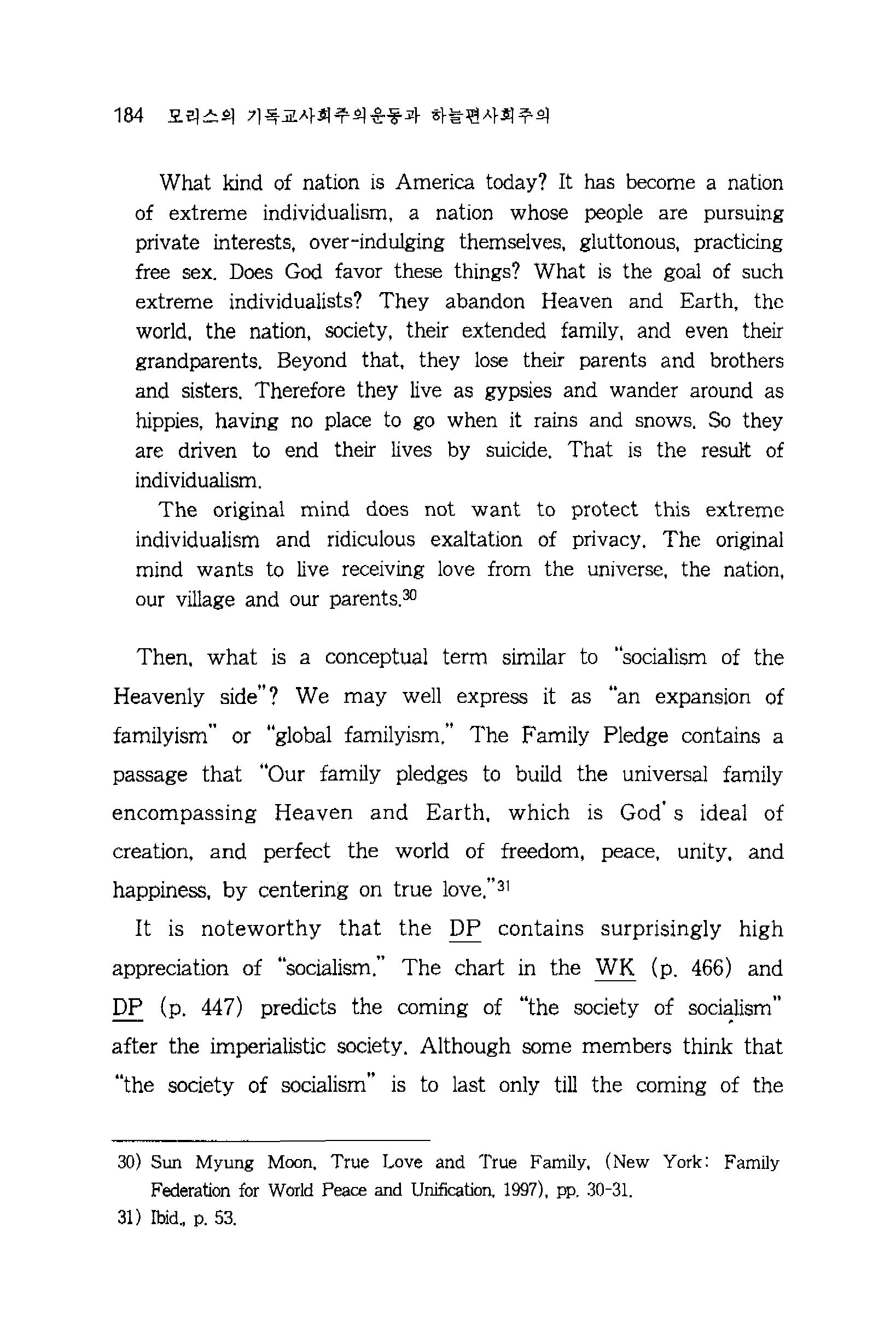
What kind of nation is America today? It has become a nation of extreme individualism, a nation whose people are pursuing private interests, over-indulging themselves, gluttonous, practicing free sex. Does God favor these things? What is the goal of such extreme individualists? They abandon Heaven and Earth, the world, the nation, society, their extended family, and even their grandparents. Beyond that, they lose their parents and brothers and sisters. Therefore they live as gypsies and wander around as hippies, having no place to go when it rains and snows. So they are driven to end their lives by suicide. That is the result of individualism.
The original mind does not want to protect this extreme individualism and ridiculous exaltation of privacy, The original mind wants to live receiving love from the universe, the nation, our village and our parents. 30
Then, what is a conceptual term similar to "socialism of the Heavenly side"? We may well express it as "an expansion of familyism" or "global familyism." The Family Pledge contains a passage that "Our family pledges to build the universal family encompassing Heaven and Earth, which is God's ideal of creation, and perfect the world of freedom, peace, unity, and happiness, by centering on true love." 31
It is noteworthy that the DP contains surprisingly high appreciation of "socialism." The chart in the WK (p. 466) and DP (p. 447) predicts the coming of "the society of soci~lism" after the imperialistic society, Although some members think that "the society of socialism" is to last only till the coming of the
30) Sun Myung Moon. True Love and True Family, (New York: Family Federation for World Peace and Unification. 1997), PP. 30-31.
31) Ibid., p. 53.
Lord of the Second Advent, that is a wrong interpretation. DP clearly presented the ideal society, which is to be built under the guidance of the Lord of the Second Advent, as "a socialistic society on Heavenly side." For example, DP noted as follows:
Consequently, man's original mind, headed for a socialistic society of the heavenly side, comes after all to advocate the principle of coexistence, co-prosperity and common cause, finally realizing the ideal world in which God's purpose of creation is actualized. This is the true Kingdom of heaven on earth centering on the Lord of the Second Advent. (I)P, p. 445.)
Many liberal theologians, who used to dislike the Unification Church members' anti-communist activities, were surprised and pleased with the high appreciation of "socialism" in DP.
4. 2. On "Coexistence, Co-prosperity, and Common Cause"
DP clearly presented the ideal society, which can be called "a socialistic society on the Heavenly side," as a society based on "the principles of coexistence, co-prosperity, and common cause" (DP, p_ 445). The following interpretation is not a summary of Dr. Sang Hun Lee's interpretation in his The Coming of the Age of Head-Wing Thought (Tokyo: Kogensha, 1997), which extensively discussed "the principles of co-living, co-prosperity, and co-righteousness."
32 I would like to present the following as a complimentary interpretation that will illuminate the Korean terms kong-saeng, kong-yong, kong-eui-chueui in WK.
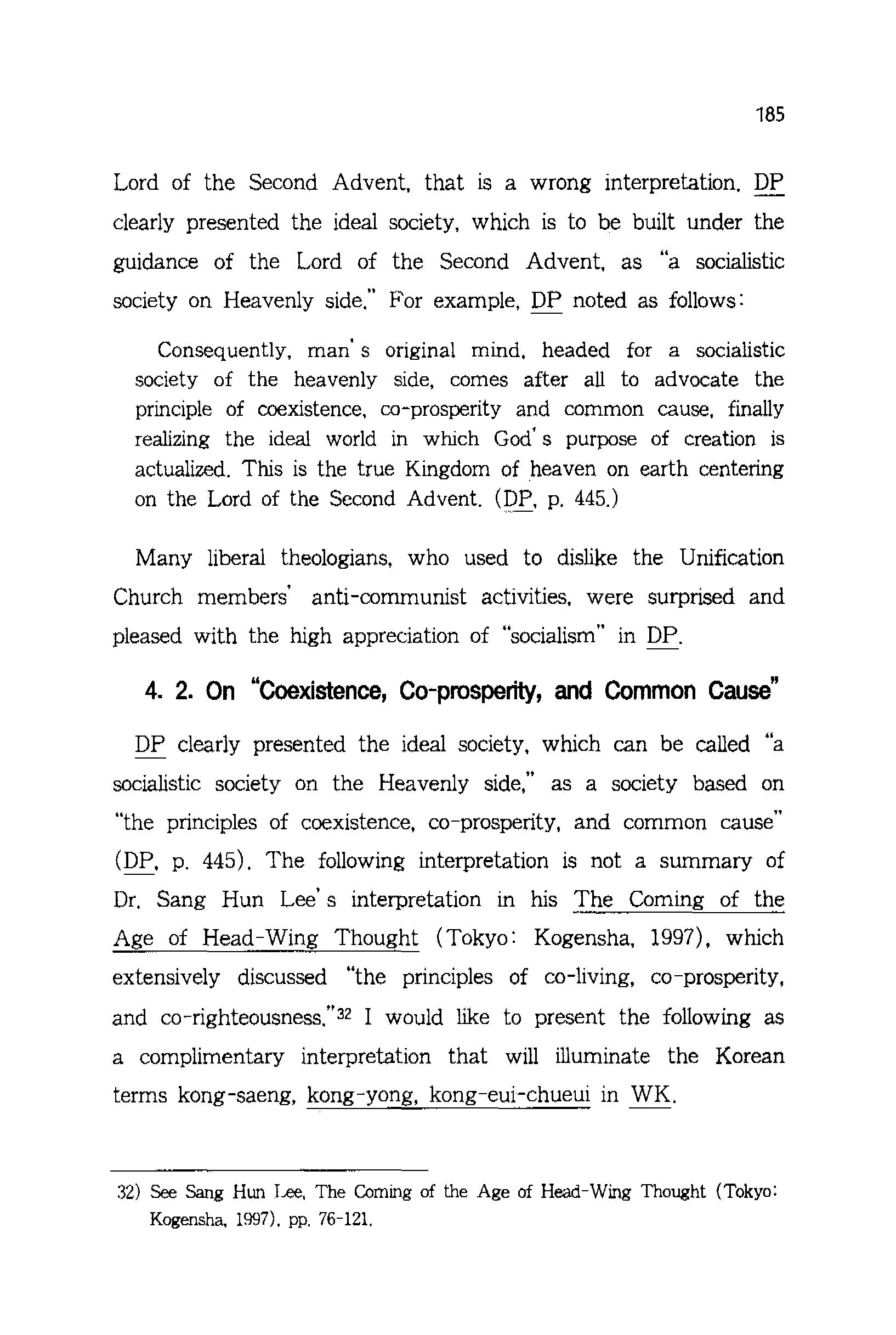
32) See Sang Hun Lee, The Coming of the Age of Head-Wing Thought (Tokyo: Kogensha, 1997), pp, 76-121.
185
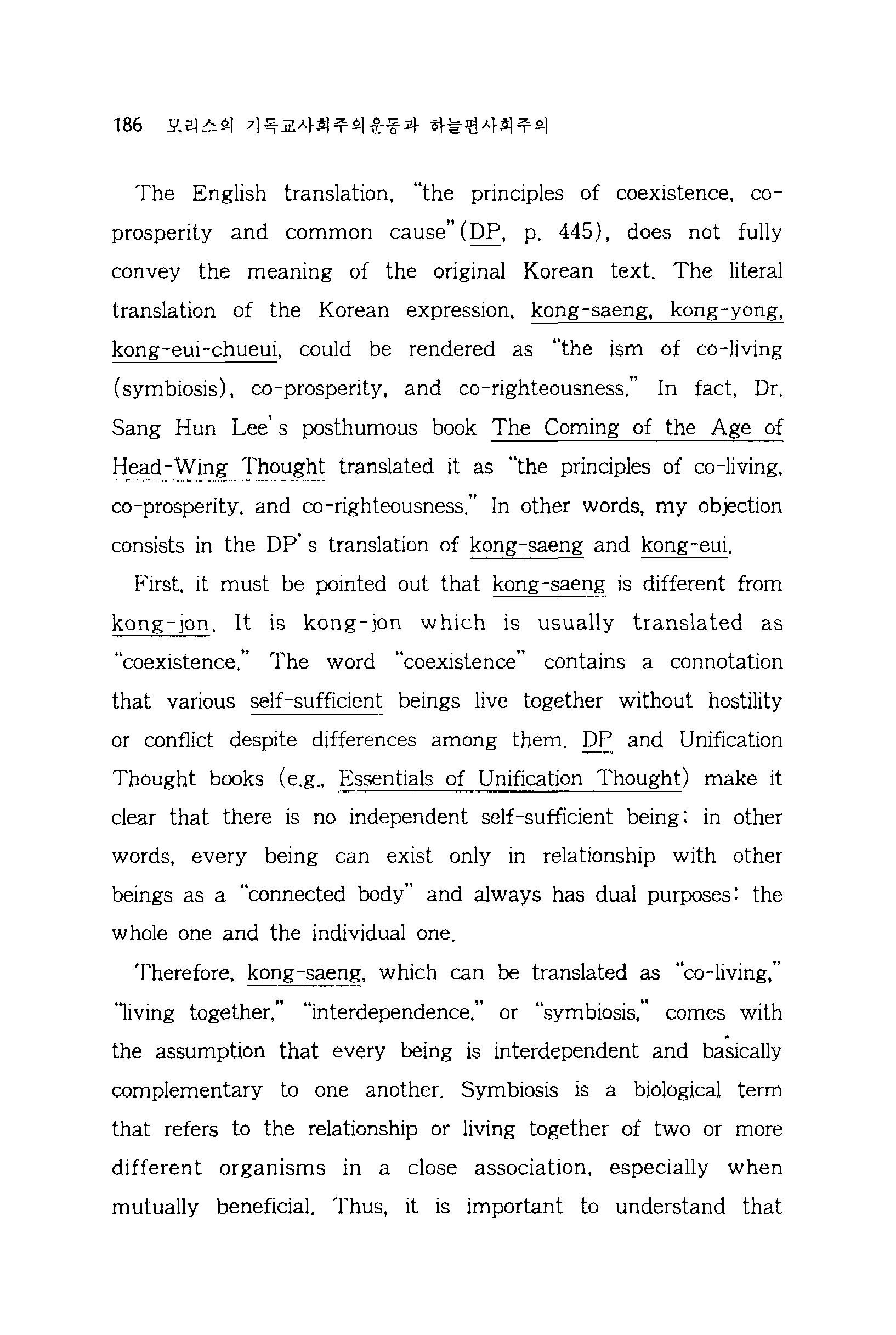
The English translation, "the principles of coexistence, coprosperity and common cause" ( DP, p. 445), does not fully convey the meaning of the original Korean text. The literal translation of the Korean expression, kong-saeng, kong-yong, kong-eui-chueui, could be rendered as "the ism of co-living (symbiosis), co-prosperity, and co-righteousness." In fact, Dr. Sang Hun Lee's posthumous book The Coming of the Age of Head- '0'inf;: _T~o!:(_g:~t translated it as "the principles of co-living, co-prosperity, and co-righteousness." In other words, my objection consists in the DP' s translation of kong-saeng and kong-eui.
First, it must be pointed out that kong-saeng is different from kong-jon. It is kong-jon which is usually translated as "coexistence." The word "coexistence" contains a connotation that various self-sufficient beings live together without hostility or conflict despite differences among them. _)?_[' and Unification
Thought books (e.g., _f_ssentials of Unification Thought) make it clear that there is no independent self-sufficient being; in other words, every being can exist only in relationship with other beings as a "connected body" and always has dual purposes: the whole one and the individual one.
Therefore, kong-saeng, which can be translated as "co-living," '1iving together," "interdependence," or "symbiosis," comes with the assumption that every being is interdependent and ba~ically complementary to one another. Symbiosis is a biological term that refers to the relationship or living together of two or more different organisms in a close association. especially when mutually beneficial. Thus, it is important to understand that
Reverend Moon' s vision of the ideal society, which can be called "a socialistic society of the Heavenly side," advocates such symbiotic relations in a society, I also have an obj2ction to the DP' s translation of kong-eui as "common cause." The order of kong-saeng kong-yong kong-eui implies the order of cause and effect. In other words, it implies that the symbiotic relations (kong-saeng) result in co-prosperity (kong-yong), and these symbiotic relations and co-prosperity, in turn, result in kong-eui. I do not think, therefore, that rendering kong-eui as "common cause" is fully intelligible. Neither am I satisfied with EDP' s new translation of the passage: "universally shared values." (EDP, pp. 342, 344.) Although it is not an ordinary English word, I am convinced that its literal translation, "co-righteousness,'' to be more accurate than "common cause" or "universally shared values." If elegance and lucidity in English is more important than accuracy, I suggest that we translate kongeui as "mutual righteousness." 33 The placement of kong-eui at the end of the phrase suggests that "co-righteousness" (or "mutual righteousness") is the final goal of the symbiotic relations and co-prosperity,
In this sense, it is noteworthy that as mentioned above Dr. Sang Hun Lee's recent books, The End of Communism (Tokyo: UTI, 1985) and The Coming of the Age of Head-Wing
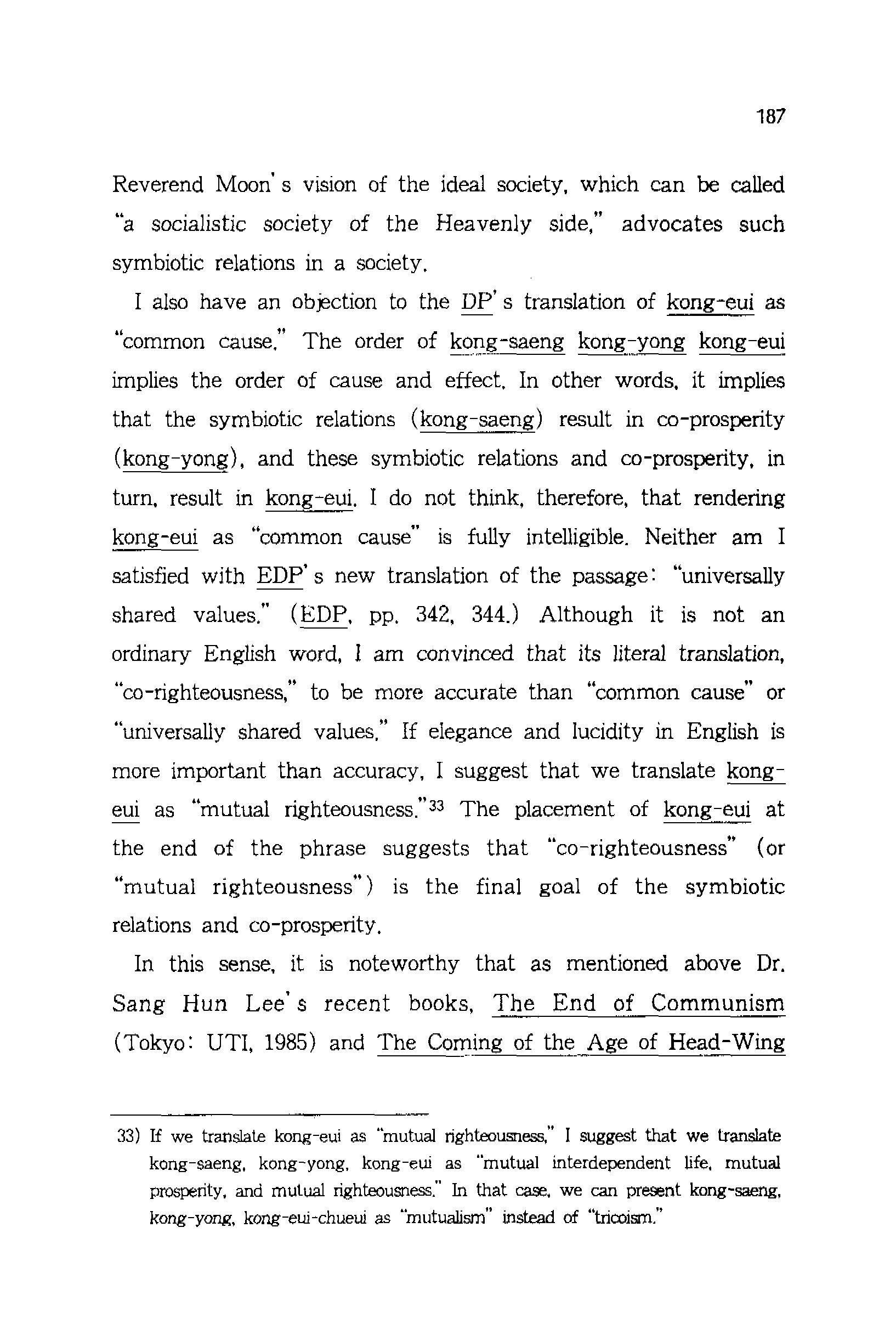
33) If we translate kong-eui as "mutual righteousness," I suggest that we translate kong-saeng, kong-yong, kong-eui as "mutual interdependent life, mutual prosperity, and mutual righteousness." In that case, we can present kong-saeng, kong-yong, kong-eui~chueui as "mutualism" instead of "tricoism."
187
Thought (Tokyo: Kogensha, 1997), translated kong-eui as "corighteousness.'' Discussing the coming of an ideal global state, Dr. Lee noted as follows:
It is the Unification Thought view that in the course of human history the unified state will be realized in the future, in accordance with God' s providence. That will be the Kingdom of God, the kingdom of heaven on earth, the state based on Cosmic Law, the state where the spiritual world and the earthly world are united into one, and the state based on the principles of coexistence, co-prosperity, and co-righteousness, which can be called a society of tricoism (i.e., a society of the three "co-" principles) . 34
Accordingly, it is my conclusion that the Korean Divine Principle book, WK, advocates the ism (principles) of "corighteousness," in clear contrast to the traditional Western concept of "atomistic-individualistic righteousness.'' In traditional Western Protestantism, the emphasis has been placed on the importance of each individual's being declared righteous (justification) by God. In the past, certain Calvinistic tradition, which might be called "vulgar Calvinism," took it for granted that even members of the same family would not necessarily share the same fate in their life after death; that is. some would go to heaven and others to hell.
Unificationism, however, insists that no individual can 'attain true and complete righteousness independently from the fate of others because each person, who is a member of a large cosmic
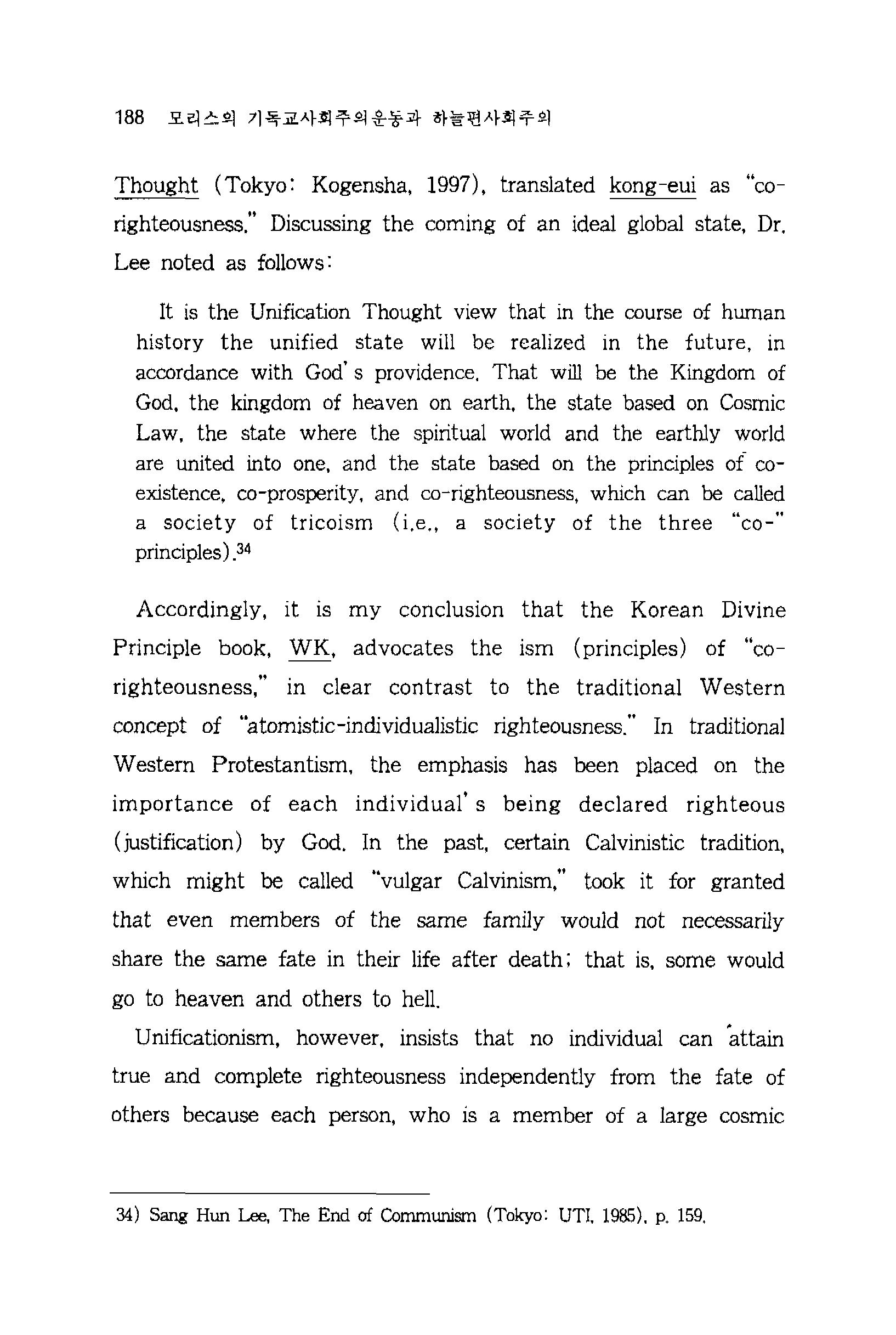
34) Sang Hun Lee, The End of Communism (Tokyo: UT!. 198.'i). p, 159,

family centered on God, is an interdependent and interconnected being, Thus. according to Reverend Moon's vision, as long as there exist suffering, oppression, and injustice on earth, God' s parental heart cannot be free from pain and suffering. Accordingly, we cannot be a truly righteous and filial son or daughter of God as long as God' s heart has a painful spot. In other words, as long as there exists even one suffering person on earth, no Unificationist is qualified to relax and to enpy an easy life; this is simply because God cannot feel happy to see such a suffering person. DP (pp. 206-7) emphasizes that even if only one person suffered, God' s heart would feel pain because each individual person has uniquely precious value (i.e., there exists no identical person throughout human history). Therefore, for Unificationists. one can attain true righteousness only with a concern for others' attaining righteousness: put differently, true righteousness is attainable only through "co-righteousness" because of the symbiotic relations one should have with one another.
4. 3. On the DP' s V'teW of the Ideal
Society as a Socialistic Society
Thus, if we regard cooperation or "co-living" as the central element of socialism just as F. D. Maurice did, DP is not antagonistic to the principle of socialism at all because DP agrees with Maurice in that society is "not a collection of warring atoms." Far from being hostile to socialism, as mentioned above, DP describes the ideal society (i.e .. Heavenly Kingdom on earth) as "a socialistic society centering on God'' (DP, p. 444.) and as
189
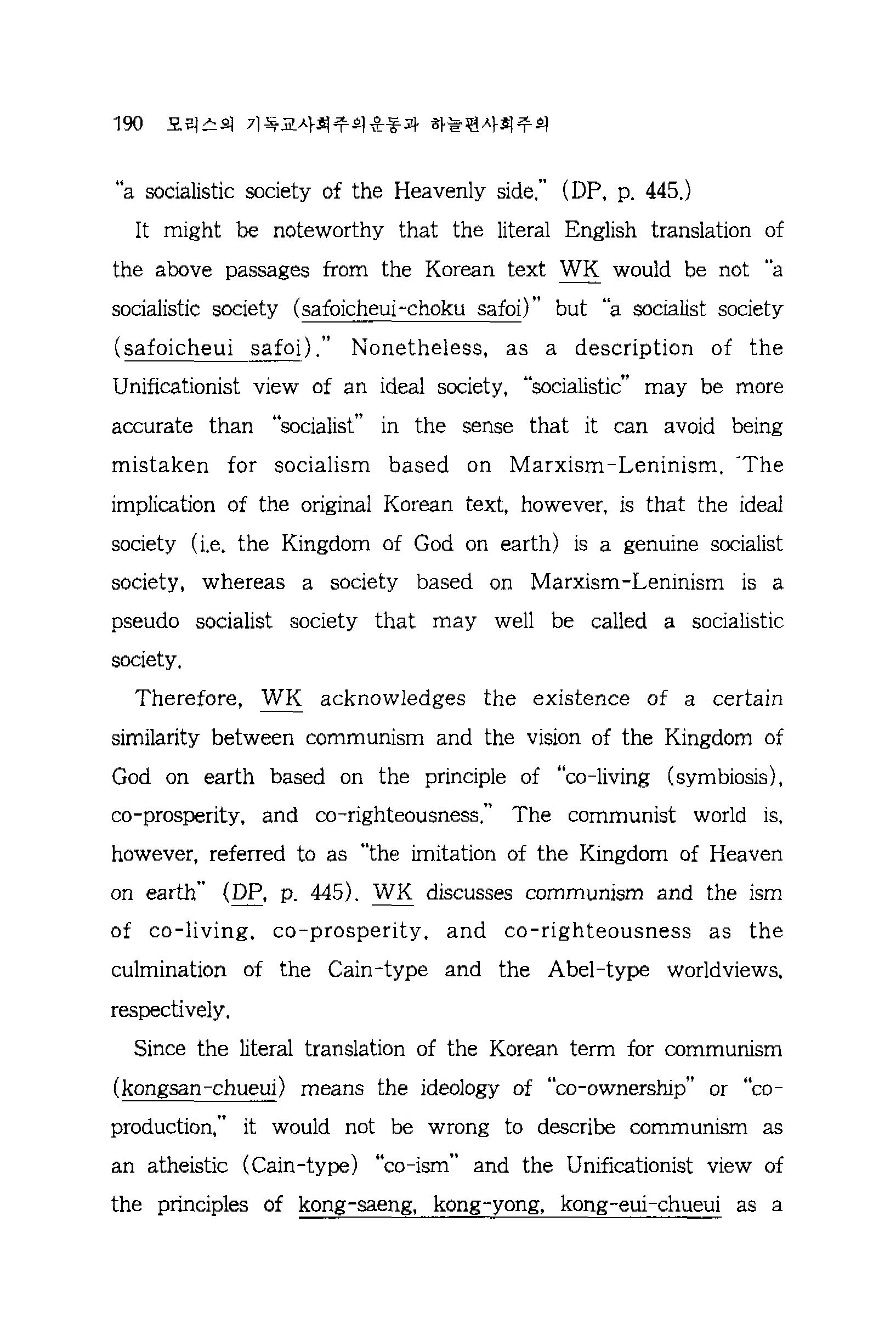
"a socialistic society of the Heavenly side." (DP, p, 445.)
It might be noteworthy that the literal English translation of the above passages from the Korean text WK would be not "a socialistic society (safoicheui-choku safoi)" but "a socialist society ( safoicheui safoi)." Nonetheless, as a description of the Unificationist view of an ideal society, "socialistic" may be more accurate than "socialist" in the sense that it can avoid being mistaken for socialism based on Marxism - Leninism. "The implication of the original Korean text, however, is that the ideal society ( i.e. the Kingdom of God on earth) is a genuine socialist society, whereas a society based on Marxism-Leninism is a pseudo socialist society that may well be called a socialistic society,
Therefore, WK acknowledges the existence of a certain similarity between communism and the vision of the Kingdom of God on earth based on the principle of "co-living (symbiosis), co-prosperity, and co-righteousness." The communist world is, however, referred to as "the imitation of the Kingdom of Heaven on earth" (DP, p_ 445). WK discusses communism and the ism of co-living, co-prosperity, and co-righteousness as the culmination of the Caiwtype and the Abel-type wor!dviews, respectively.
Since the literal translation of the Korean term for communism (kongsan-chueui) means the ideology of "co-ownership" or "coproduction," it would not be wrong to describe communism as an atheistic ( Cain-type) "co-ism" and the Unificationist view of the principles of kong-saeng, kong-yong, kong-eui-chueui as a

theocentric (Abel-type) "co-ism" in order to high-light their similar socialistic vision (i.e., anti-atomistic individualism) as well as their different philosophical foundations. We may well say that the former is characterized by forced collectivism (state socialism) and the latter by voluntary associationism (socializationism). In other words, for Unificationists, the former is a "pseudo familyism" because of its use of coercive power and its exclusion of God, the parent of all human beings, whereas the latter is a genuine universal familyism centered on God and on God's parental heart (shimjung).
4. 4. Towards a Socialistic Lifestyle in the Unification Movement?
Although some Unificationists tend to de-emphasize or ignore this fact, as mentioned above, DP regards the ideal society as "a socialistic society centering on God." Therefore, it is natural that the lifestyle of the Unificationists should and will become more and more "socialistic." In fact, for years, Reverend Moon has emphasized what we may well call "cosmic familyism" and "a socialistic lifestyle" as an ideal lifestyle for us all, in order to prepare for our life in the spirit world. We can interpret his repeated critiques of atomistic individualism as an advocacy of a socialistic lifestyle.
Some of the Reverend Moon' s words that are concerned with such a socialistic life on earth include his emphasis on the "leveling of technology throughout the world," which means sharing and equalizing the technology between the rich nations and the poor nations. Therefore, Reverend Moon has been
191
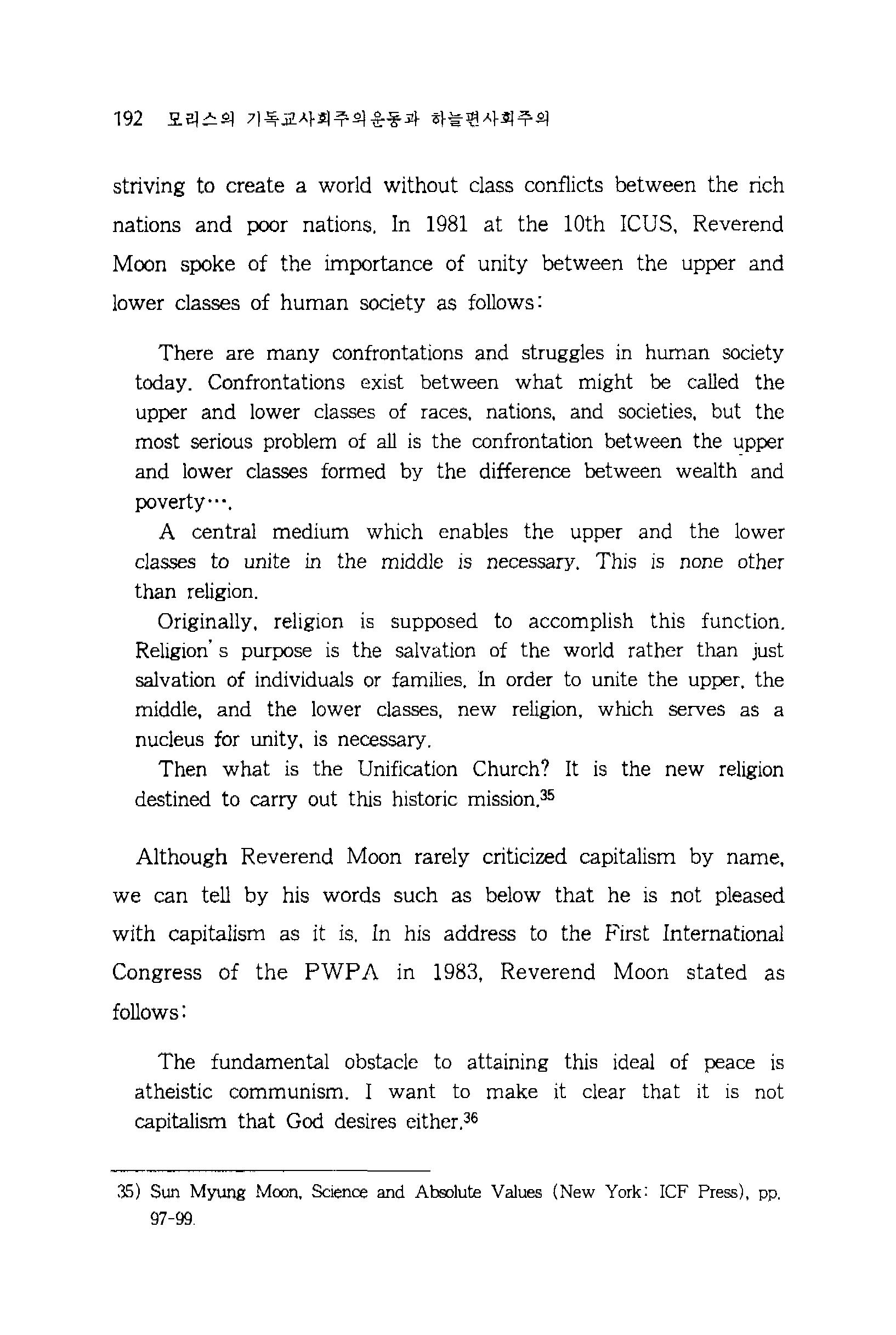
striving to create a world without class conflicts between the rich nations and poor nations. In 1981 at the 10th ICUS, Reverend Moon spoke of the importance of unity between the upper and lower classes of human society as follows:
There are many confrontations and struggles m human society today_ Confrontations exist between what might be called the upper and lower classes of races, nations, and societies, but the most serious problem of all is the confrontation between the l!Pper and lower classes formed by the difference between wealth and poverty···.
A central medium which enables the upper and the lower classes to unite in the middle is necessary, This 1s none other than religion.
Originally, religion is supposed to accomplish this function. Religion" s purpose is the salvation of the world rather than just salvation of individuals or families. In order to unite the upper, the middle, and the lower classes, new religion. which serves as a nucleus for unity, is necessary.
Then what is the Unification Church? It is the new religion destined to carry out this historic mission. 35
Although Reverend Moon rarely criticized capitalism by name, we can tell by his words such as below that he is not pleased with capitalism as it is. In his address to the First International Congress of the PWPA in 1983, Reverend Moon stated as follows:
The fundamental obstacle to attaining this ideal of peace is atheistic communism. I want to make it clear that it is not capitalism that God desires either. 36
3.S) Sun Myung Moon. Science and Aboolute Values (New York: !CF Press), pp, 97-99.

As for Reverend Moon's instructions to members with regard to wealth, he once asked all the Unification Church members in Korea to donate to the Church Headquarters one third of money on deposit in their personal bank accounts. Moreover, in the 1990s, Reverend Moon frequently spoke to the Unification Church members that in the near future the Blessed families should live in trinity. In other words, he advised us that each three Blessed families should live together as a cooperative unit in a condominium or in a housing complex. Furthermore, according to Reverend Moon's vision, each trinity will consist of different nationalities and races. After every twelve years, each trinity of families will be reorganized; each new trinity of families will be made of different Blessed families and live together for another twelve years. The reason why we have to rearrange each trinity families internationally every twelve years is to equalize the living standard of the whole world. This process will be repeated until the Kingdom of God on earth is completed. 37
Likewise, Reverend Moon spoke to Japanese women in 1994 as follows:
Due to the principles of restoration through indemnity, the Blessed families from four different nations will live together in a
36) Sun Myung Moon. "PWP A and Our Resolution," Speech at the First International Congress of the PWP A Delivered on 18 December 1983 at Seoul, Korea.
'.l?) See Sun Myung Moon, "A Speech Delivered after Pledge Service on the Eighth FoU!ldation Day for the Nation of the Unified World." [Delivered on 3 October 1995.] Shukufuku 87 (Winter 1995): 14-22.
193
condominium in the future. By living in such a way, the Blessed families are to educate their children not as their own children but as the children of the whole world. All parents should have an attitude that they are parents responsible for children from four continents. Thus. parents are supposed to educated their children cooperatively with other parents. Unless we live in such a way, we cannot unify the world. If we do not acquire such a heart as to take good care of children of other families as if they were our own, the world will not be unified. If we discriminate children of the next-door families from our own children. such an attitude will cause a problem when different families live together in the same housing complcx.38
This kind of the living arrangement may be called a "communitarian" or "communalist" lifestyle m a larger sense.
Reverend Moon' s speech on the importance of three ( or four) families closely and cooperatively living together reminded me of the famous Christian socialist feminist theologian. Rosemary Ruether; she has advocated "a communitarian lifestyle" or "communalist socialism" in order to liberate women from the scicalled "second shift," that is. continuous home chores after regular outside job. According to her. "[communalisl socialism] tries to create a new extended family that lives together, owns and manages its own means of livelihood and collectively raises its children."
39
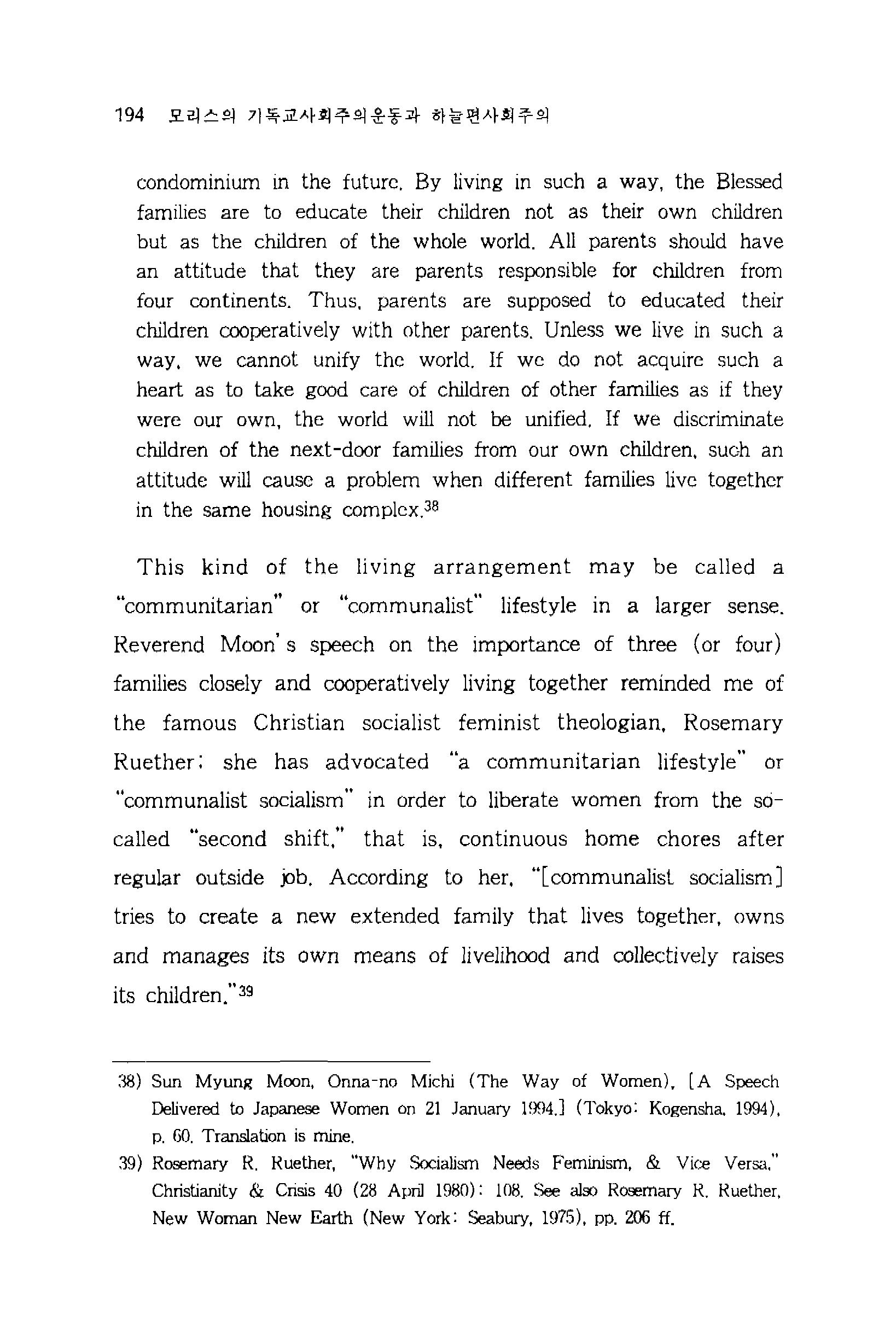
::18) Sun Myung Moon, Onna-no Michi (The Way of Women). [A Speech Delivered to Japanese Women on 21 January 1994.J (Tokyo: Kogensha. 1994), P. GO. Translation is mine.
39) Roremary R. Ruether, "Why Socialism Needs Feminism, & Vice Versa." Christianity & Crisis 40 (28 April 1980): 108. See alro Roremary R. Ruether, New Woman New Earth (New York: Seabury, 1975), PP. 206 ff.
Can we say that the Reverend Moon supports a moderately communalist lifestyle? If we use John Lofland and James Richardson's typology of religious movement organizations, the Reverend Moon's vision of the ideal lifestyle in the Unification movement belongs to a type of the "household collective" and seems to be more "socialistic" than a movement centered on its "congregations." 40 Reverend Moon is very critical of MarxismLeninism and of state socialism. Nonetheless, according to our reading of his speeches, Reverend Moon clearly supports such a moderately communitarian or communalist lifestyle as advocated by Ruether. Viewing from various points, we can surely assert that the Unification movement is "a genuinely socialistic movement." The fact that ( we can assert that) the Unification movement is "a genuinely socialistic movement" may turn out to be of great help in converting the communist Mainland China and North Korea to Unificationism and thus to "socialism of the Heavenly side."
5. Conclusion
In the first two sections of this paper, we studied F. D. Maurice and his Christian Socialist movement in the mid-
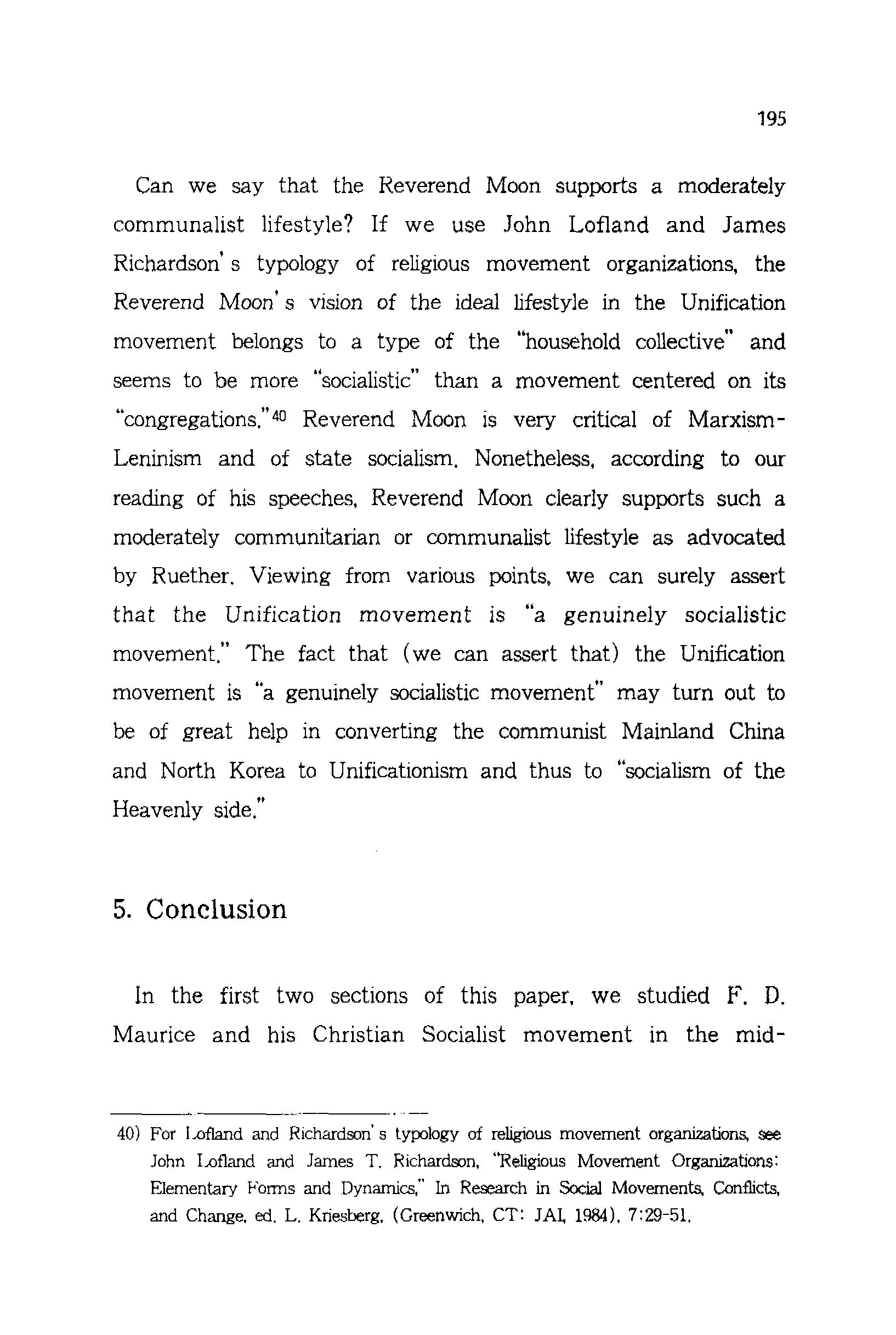
40) For Lofland and Richardson's typology of religious movement organizations, see John Lofland and James T. Richardson, "Religious Movement Organizations: Elementary Forms and Dynamics," In Research in Social Movements, Conflicts, and Change, ed. L. Kriesberg, (Greenwich, CT: JAL 1984). 7:29-51.
195
nineteenth century, with a purpose of understanding the concept of "socialism of the Heavenly side" in WK. In the third section, we attempted to understand the meaning of "socialism of the Heavenly side" in WK.
Maurice was sometimes criticized as "a progressive turned a reactionary.'' Nonetheless, in my view as well as in the view of Torben Christensen, he was very consistent in his theology. 41 It seems to me that Reverend Moon' s approach to the Kingdom building is much closer to Maurice than to Ludlow. Like Maurice, the Unification movement is very concerned with social education of God or showing God as our parents and as our common ground of being rather than with external system building. In other words, regeneration of individuals and society centering on God's love is emphasized rather than external social reform as a way to build a peaceful socialistic world.
In this paper, on the basis of WK and Reverend Moon' s speeches, I asserted that the Unification movement has been promoting a socialistic lifestyle and that it would become more and more socialistic or communitarian. In my view, "socialism of the Heavenly side" has more to do with human relations than with a large society. In other words, it has more to do with love than with coercive power of state. "Socialism of the Heavenly side" does not promote forced collectivism or state socialism; but

41) For a critique of Maurice as "a Progressive turned a Reactionary," see Christensen, Origin and History of Christian Socialism, pp. 11-34. For consistency uf Maurice's theology. see Torben Christensen, The Divine Order: A Study in F. D. Maurice's Theology (Leiden: E. J. Brill, 1973).
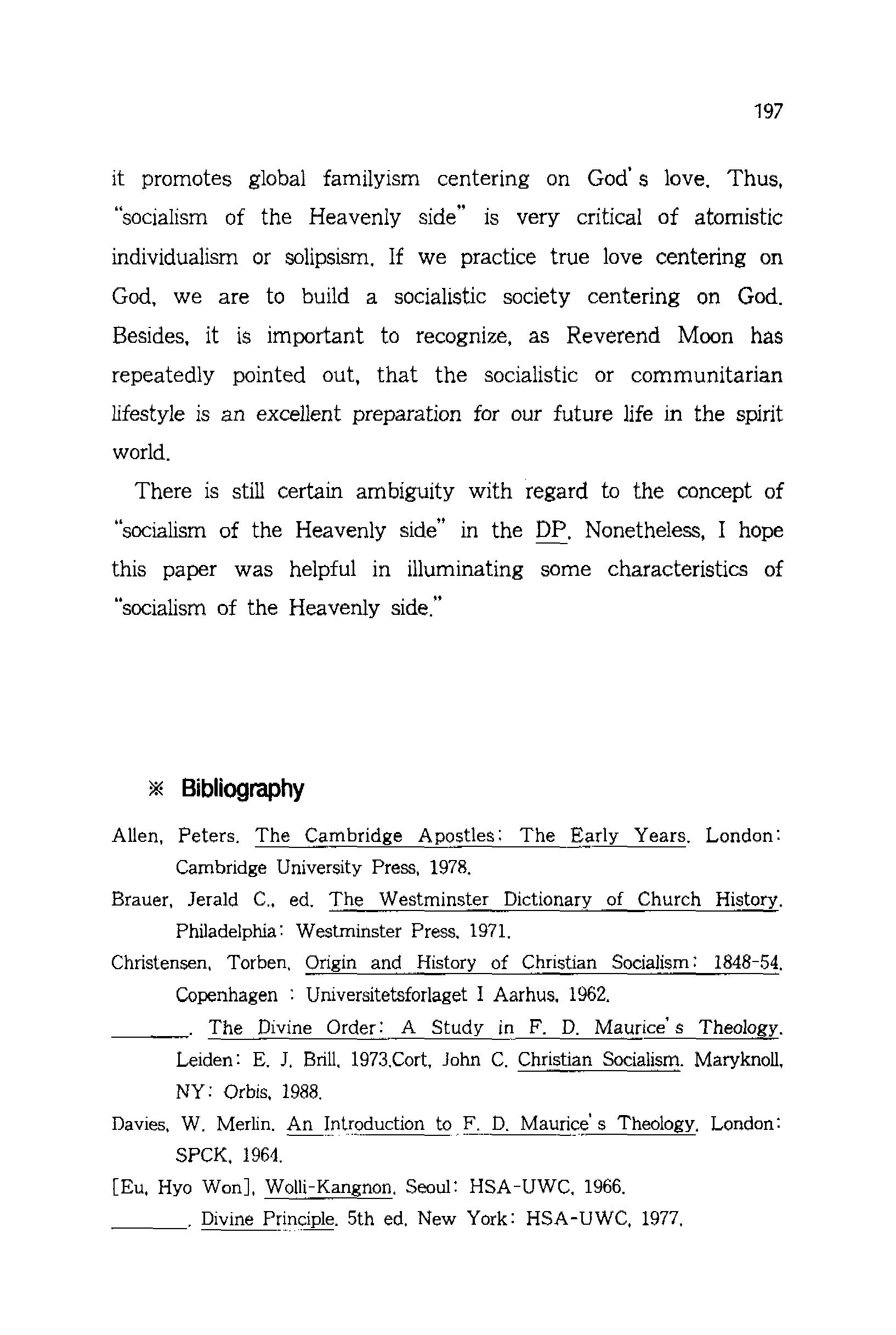
it promotes global familyism centering on God' s love. Thus, "socialism of the Heavenly side" is very critical of atomistic individualism or solipsism. If we practice true love centering on God, we are to build a socialistic society centering on God. Besides, it is important to recognize, as Reverend Moon has repeatedly pointed out, that the socialistic or communitarian lifestyle is an excellent preparation for our future life in the spirit world.
There 1s still certain ambiguity with regard to the concept of "socialism of the Heavenly side" in the DP. Nonetheless, I hope this paper was helpful in illuminating some characteristics of "socialism of the Heavenly side."
* Bibliography
Allen, Peters. The Cambridge Apostles: The Early Years. London: Cambridge University Press, 1978.
Brauer, Jerald C., ed. The Westminster Dictionary of Church History. Philadelphia: Westminster Press. 1971.
Christensen, Torben, Origin and History of Christian Socialism: 1848-54. Copenhagen : Universitetsforlaget I Aarhus. 1962.
___ . The Divine Order: A Study in F. D. Maurice's Theology. Leiden: E. J. Brill. 1973.Cort, John C. Christian Socialism. Maryknoll, NY: Orbis, 1988.
Davies, W. Merlin. An ~ntroduction to F. D. Maurie:~• s Theology, London: SPCK. 1961.
[Eu, Hyo Won]. Wolli-Kangnon. Seoul: HSA-UWC. 1966.
___ . Divine Principle. 5th ed. New York: HSA-UWC, 1977.
197

____
. Exposition of the Divine _Principle. New York: HSA-UWC, 1996.Lee. Sang Hun. The End of Communism. Tokyo: UT], 1985, --~· Essentials of Unification Thought, Tokyo: UT!. 1992.
____ The Coming --~f the Age of Head-Wing Thought. Tokyo'. Kogensha, 1997.
Lofland, John, and James T. Richardson. "Religious Movement Organizations: Elementary Forms and Dynamics." In Research in Social Movements. Conflicts, and Change, vol. 7, ed. L. Kriesberg, pp. 29-51. Greenwich, CT: JAi. 1984, Masterman, N. C. l_()_hri_ Malcolm Ludlow: The Builder of Christian Socialism. London: Cambridge Univ. Press. 1963.Maurice, Frederick Denison. Social Morality. London: John W. Parker & Son, 1853.
___ The Life of Fred~~c~ J?~nison Maurice, ed. his son Frederick Maurice. 2 vols. New York: Charles Scribner's Sons, 1884.
___ . The Doctrine of Sacrifice. London: Macmillan & Co .• 1893. Moon, Sun Myung. Science and Absolute Values. New York: ICF Press, 1982.
___,. "PWP A and Our Resolution." A Speech at the First International Congress of the PWP A, Delivered on 18 December 1983 at Seoul, Korea. [Partly printed in Today's World (January-February 1984): 41-45.]
___
Onna-no Michi (The Way of Women), [A Speech Delivered on 21 January 1991.] Tokyo: Kogensha, 1994.
"The New 'Family Pledge' ." [Delivered on 8 May 1994.] Today's World (May/June 1991): 10-14.
____ .
"A Speech Delivered after Pledge Service on the Eighth Foundation Day for the Nation of the Unified World," [Delivi,red on :1 October 1995.] Shukufuku 87 (Winter 1995): 10-27.
___ "Foundation Day for the Nation of the Unified World," [Delivered on :l October 1995.] Today's World _(November 1995): 4-20.
___.
True ~<:>ve and True Family. New York: Family Federation for World Peace and Unification, 1997.
Raven. Charles E. Christian Socialism: 1848-1854. London: Frank Cass,

1920.Ruether, Rosemary R. New Woman New Earth. New York: Seabury, 1975.
___ "Why Socialism Needs Feminism, & Vice Versa" Christianity & Crisis 40 (28 April 1980): 103-8.
Walker. Williston et al. A History of Christian Church, 3rd ed. New York: Charles Scribner's Sons, 1970.
199

